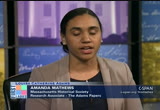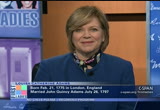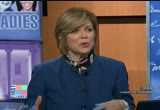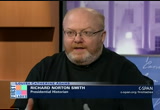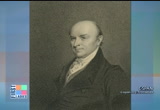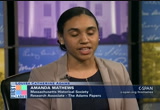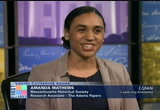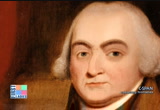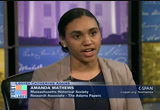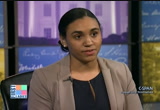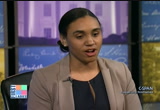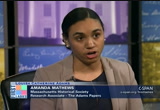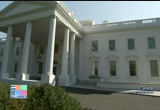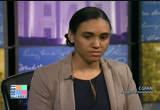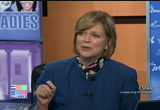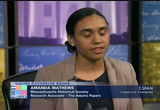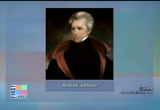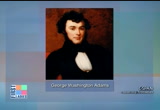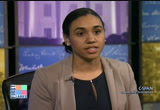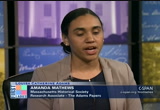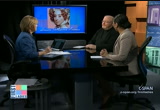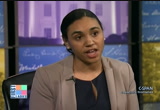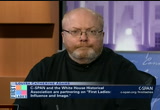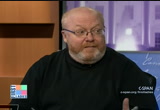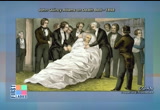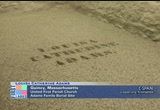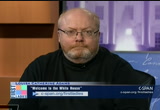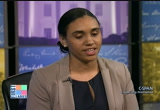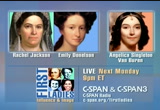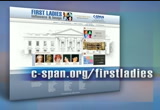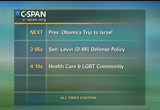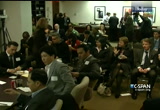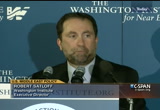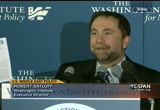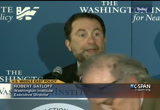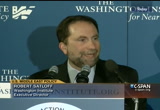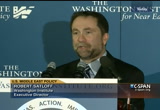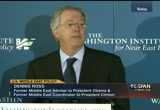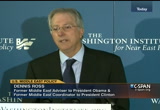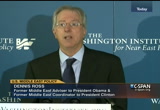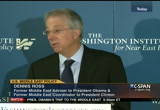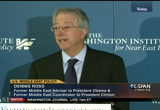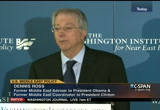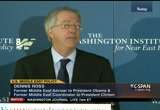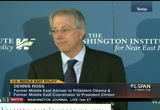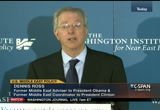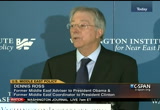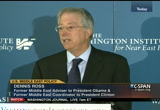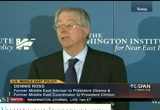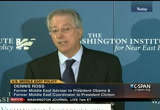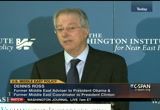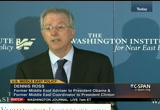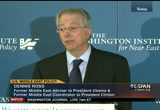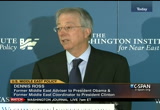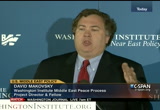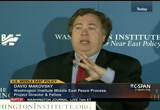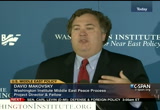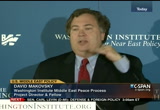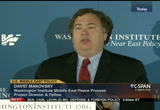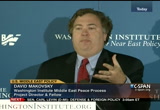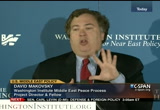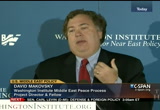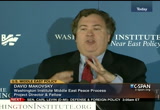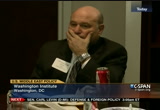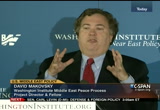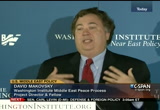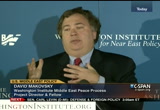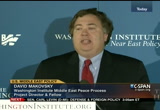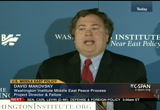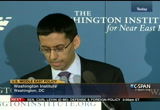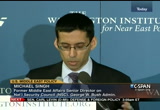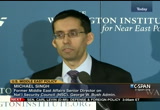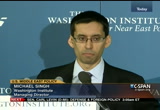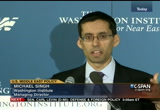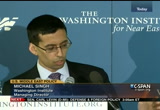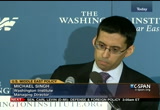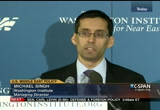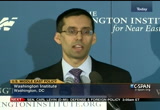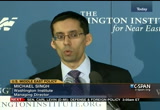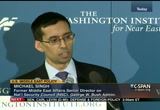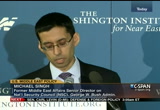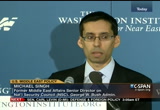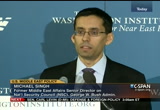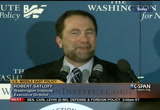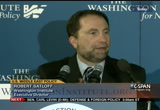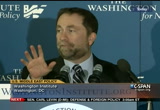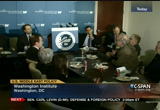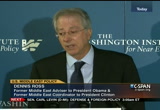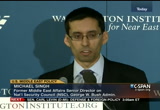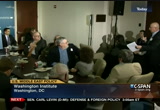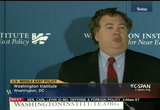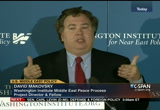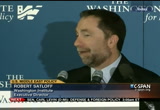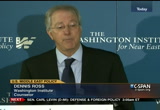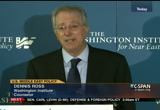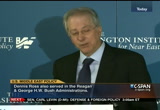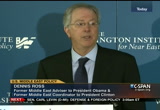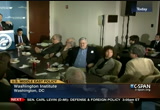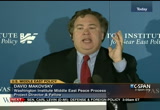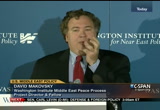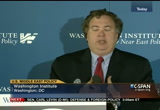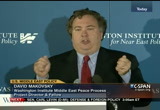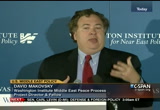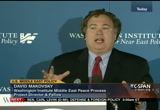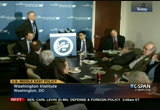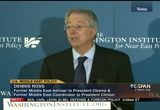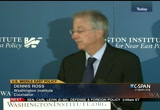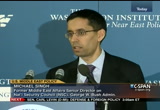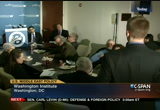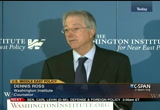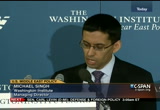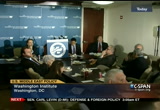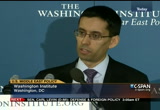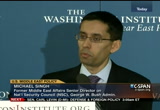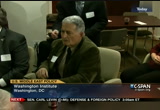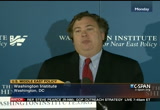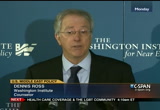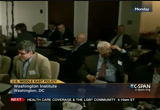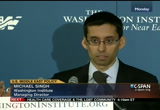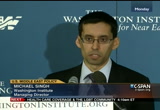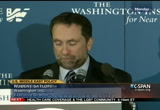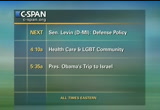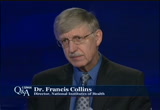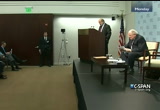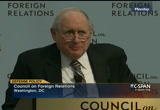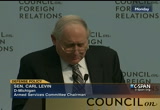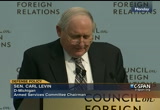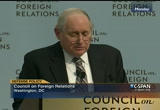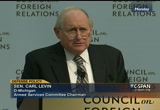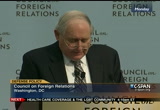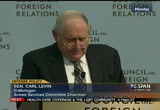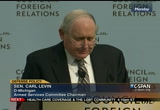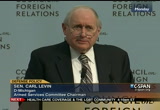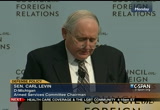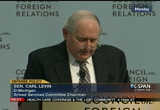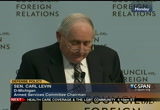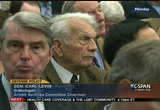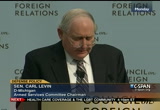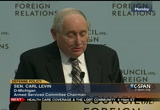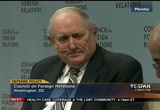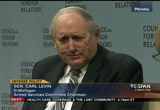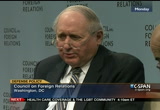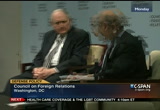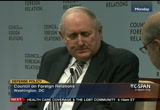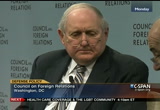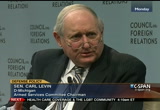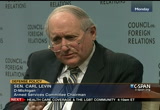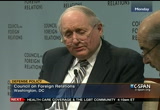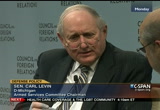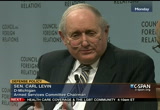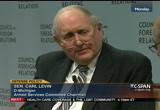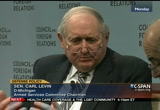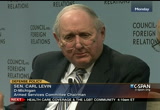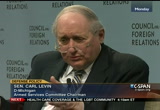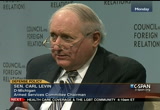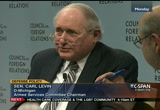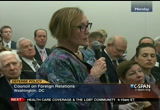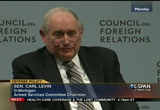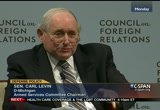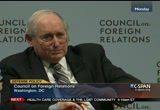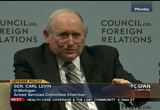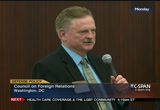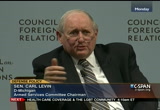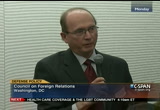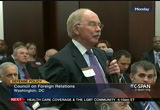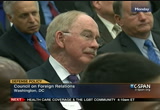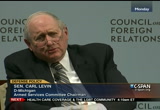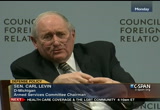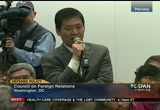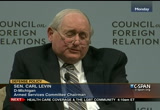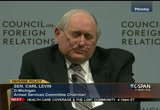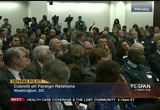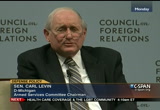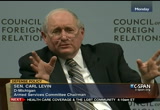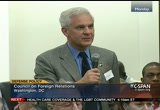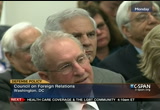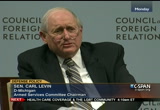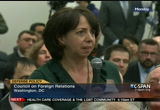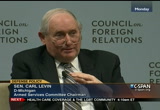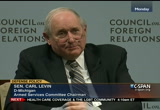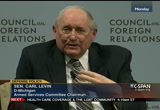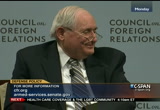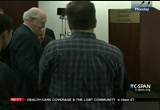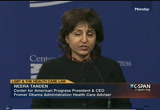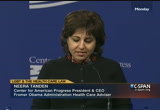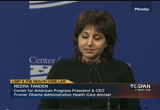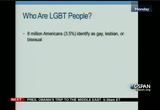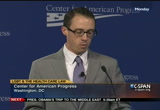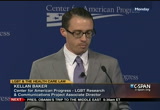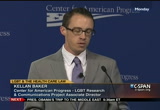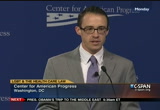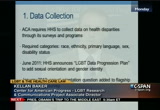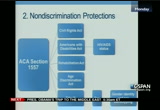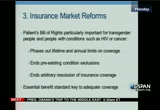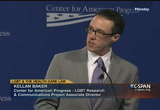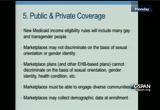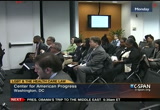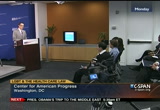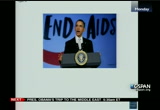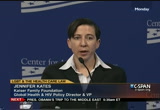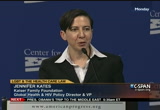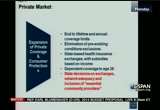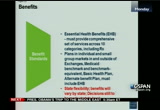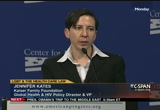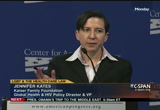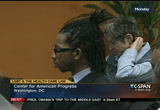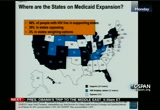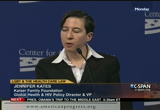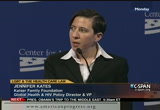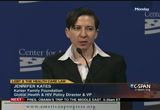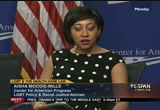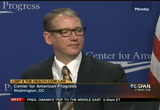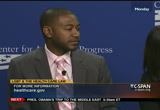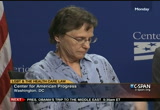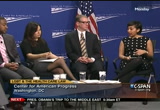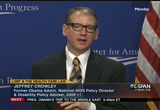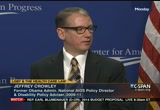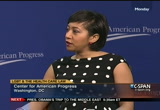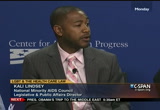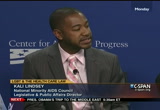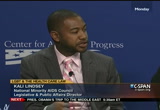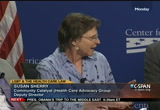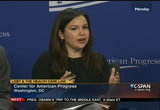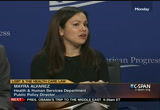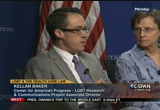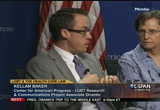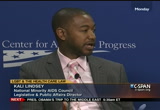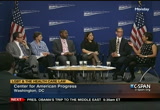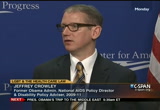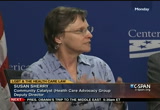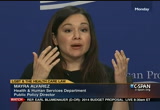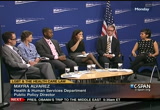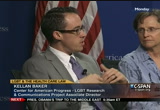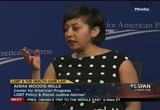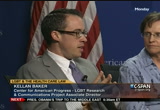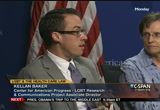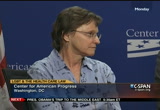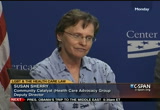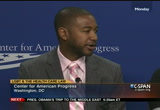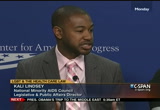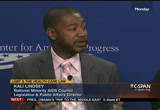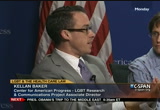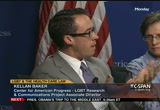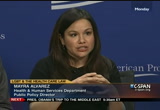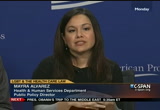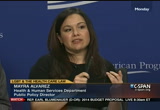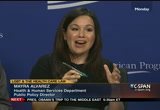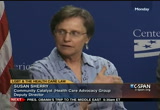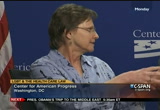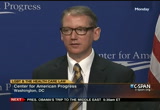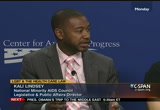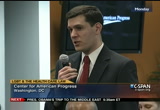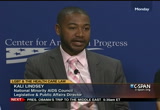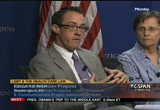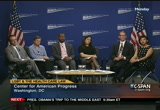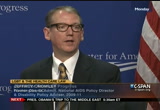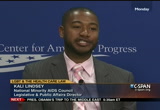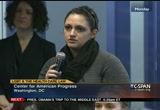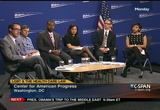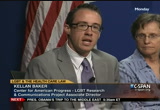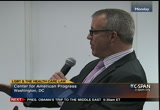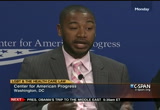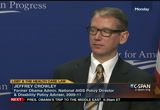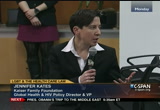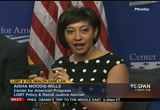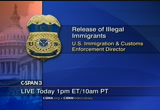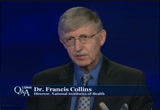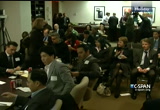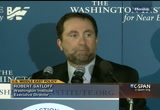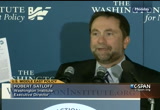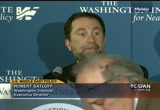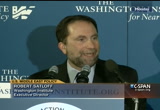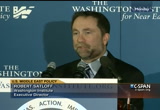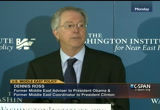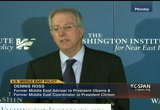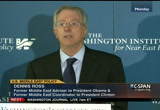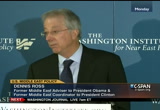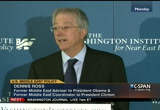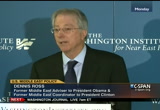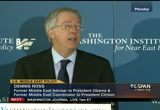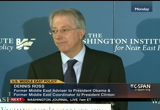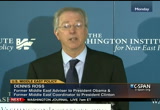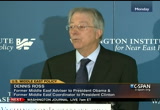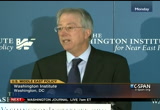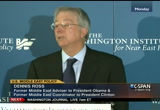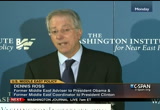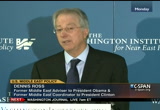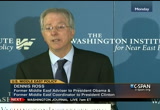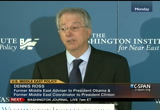tv Politics Public Policy Today CSPAN March 19, 2013 1:00am-6:00am EDT
1:00 am
the early years of her life with john quincy, they attend numerous types of churches, especially whoever the rotating preacher was in the capital during the secretary of state and presidency years could be presbyterian or unitarian. an ends up very much episcopal thinker, high church and is very, in her later years, she spends a lot of time reminiscing and reflecting on the role of religion and it's very much an important piece for her. >> next up is nick in prince frederick, maryland, hi, nick. >> first of all, thank you for this great program. i'm glad you are part of it. we have links to louisa catherine here.
1:01 am
her uncle was one of maryland's first governors. the most we have is what of our town centers, we have a plaque. and a book where you get an impression of louisa catherine that she is very involved in the politics of washington. you don't get the sense of whether it is just a surface or whether her words are contributing to the compromises
1:02 am
that are made during that time. would you mind commenting on those two things? >> that is louisa catherine's birth family. in maryland? do you know of them? >> her family was from maryland. her father was born in maryland. that is very important because that is how she makes her claim that she is an american. i met the war in london, but my father is an american. her uncle was the first governor of maryland. so, she has an important connection with maryland. she was able to use those when campaigning to get maryland to vote for john quincy adams the 1820 four election. >> how about the second question, how involved was she in the politics of the time? >> it has always been murky. there is no clear why between social politicking and the process leading to x number of votes being cast. one of the great skills begin with dolly madison, who understood that more could be achieved out of the committee
1:03 am
room, off the floor of the house, in a social setting. louisa catherine is politically and attuned figure. i don't think you would find her dictating a platform. john quincy was 100 years ahead of his time. famously, in his first message to congress, -- remember this is a man whose legitimacy had been questioned. and yet, he introduced this breathtaking program that anticipates the new deal by 100 years. saying the federal government should we in the rowboat and business. there should be a national university and washington. he proposed a national astronomical observatory. a white house of the sky. for this, he was ridiculed by the jeffersonian small government crowd.
1:04 am
it did nothing to enhance his popularity at the time. it may have contributed to his defeat for reelection. 100 years later, it looks prophetic. >> hi, jennifer. >> i am enjoying this series, i watch every week. >> thank you. >> my question is, and it may have been shown during the program, i am sorry if i have not noticed, but the portraits you have been showing of the two of them, louisa catherine and john quincy adams, was there a big age difference between them? >> thank you for asking. but explain how they met and with the age difference was. >> there is an eight year age difference. john quincy was born in 1767, louisa in 1775. they meet in london.
1:05 am
if the resident minister in the netherlands. he is sent from there to london to exchange the ratification for the jay treaty. by the times he gets to london, the business is concluded so he does not have a lot to do. what he spends his time doing is visiting the house of the johnsons, joshua johnson, her father, was the u.s. consul at london. he entertained all the americans who came through to london. a prominent merchant in london and americans would come and socialize and enjoy evenings of entertainment with as many doctors, who are all talented. louisa play the harp.
1:06 am
he would come and enjoy the company. after a little bit of time, made his intentions known that it was louisa and not her older sister, nancy, that he was interested in. they begin their courtship and engagement. theyter they married, did return to the united states? >> not immediately. john quincy is appointed from the netherlands of the minister to prussia in berlin. this been the first four years of their marriage in berlin. she does not see the united states until 1801. the first four years are somewhat difficult. she has four miscarriages in the time before finally giving birth to her first son, george washington adams. that cause controversy, naming the first son after george washington and not john. >> when she arrived to the united states, it was the first time she had seen the country of your nationality.
1:07 am
she went to the adams' home outside of boston. the place was known as peace field. we will show you that. ask when louisa and john quincy first came to the old house, they had just journeyed back from europe, landed in washington dc and made the journey up to hear. -- here. her health was not good at the time, and the journey was very difficult. she was brought to this has to to meet her father and mother in law. of that moment she would write, had i stepped onto noah's ark, i could not have been more utterly astonished. louisa catherine had a in winning over abigail adams. john adams was easy, he took to her right away. she always felt are a comfortable and well liked by him. abigail is more skeptical. perhaps due to john quincy's teasing. he only gave abigail a little bit of information about louisa
1:08 am
catherine. he was not forthright in his intentions. it was a surprise that he married louisa catherine so quickly. abigail did not get a chance to know her. she was quite concerned, although she was an american citizen, she had never been on american soil. this was not what she intended for her son. through time, she learned to grow and love and understand louisa catherine. through the years, they forged a very strong relationship. louisa catherine describing abigail adams as the planet around which all revolved. louisa catherine and john quincy, unlike john adams, if not live at peace field year- round. summerly returned in the to get a relief from the politics of washington. her grandson, henry adams, remembered louisa catherine fondly. in his works, the education of the adams, he described louisa catherine and her role in this house and relationship with the family.
1:09 am
he felt that she was the odd man out, because she was born in england and educated in france. she remained a foreign personality to many of the adams's. he recollects her sitting in her paneled room, using her silver tea pot that that she brought with her from her home in england to the old house. she would entertain both herself and many guest in this room. john quincy adams and louisa would inherit this home from john adams. i thought about selling it, but then decided that it was important to the family story to hold onto the house for future generations. >> you can visit there today. >> yes. >> wonderful. where the papers? >> they are at the
1:10 am
massachusetts historical society in boston. they used to be at the old house would distill my very, but they were transferred to the historical society for safekeeping. >> a question on facebook from genie webber. i have read excerpts from her autobiography, it said the massachusetts historical society was going to publish the papers. is that true? >> yes. a two volume of her autobiographical writings, which includes a record of my life, adventures of a nobody, and heard narrative of a journey from st. petersburg, france, and all her diaries have already been published in a scholarly edition. next year, a trade edition of these writings will be available. it has a forward by former first lady, laura bush. >> we must talk a little about st. petersburg and her incredible journey back to meet her husband.
1:11 am
can you tell was important about that story? >> in st. petersburg, and the years were difficult areas it is cold, it is forbidding. there are not a lot of other women there. most of the diplomatic biased to not travel with her husband when they get sent there. i have a baby girl, louisa catherine adams, and the child dies after about a year. that really devastates her mother. it is very painful. john quincy is also very much torn apart by the death. the war of 1812 has broken out here. he is sent to negotiated treaty and leaves louisa with her youngest son, charles francis, in st. petersburg.
1:12 am
when peace is resolved and he is sure he will be returning home or sent to london, he asks her to join him. she makes this arduous journey from st. petersburg in the winter to paris with a son who is only seven of the time. and a couple of servings that she only met that day. she does not know she can trust them. as she is crossing europe, she encounters dangerous travel conditions, and napoleon has escaped from elba and is coming back to france. she encounters the armies to greet him.
1:13 am
she is crossing some very perilous territory in europe at this time. >> her life was in danger throughout this trip. >> here is another quote from her diaries -- it was 4:00 in the evening and the ice was in so critical a state, i could with difficulty procured men and horses to go over. they informed me i would have to make a long detour if i could not cross. >> absolutely. >> a carriage in the wintertime. >> again, the resourcefulness this woman is extraordinary. >> why don't we know more about her interesting life story? why is she not better known among the first ladies? >> because john quincy's presidency has been obscured for so long, that diminished interest in her. what makes john quincy
1:14 am
interesting to historians today is his post-white house years, for which people did not seem to think that louisa was a part of. somewhat mistakenly. i think that has really kept her from being the prominent -- and abigail kind of outshines when you are talking about the adams'. >> carol is watching in santa fe. >> this is a fantastic series, i love it. you keep referring to the white house, and i understand it was called the presidents house for some time. do you know when it changed its name to the white house? >> teddy roosevelt. the beginning of the 20th century. he formally changed the main to the more informal white house. at the same time that his wife is taking the house back to its more formal style and side. >> is it true that some of the exterior was painted white after
1:15 am
the fire from the british, to cover scorch marks? that is when it began. >> it was informally referred to -- the man on the street did not refer to it as the executive mansion. teddy roosevelt made it official. >> a call from catherine in rockville, maryland. >> just wondering, was louisa ever, worker rights ever violated and wanted to do about it? >> what are you thinking of? >> social or things like her speaking out for what she believed in. >> this is a great restaurant to talk about what role women really had in society at this point in time in america. >> she is not political, she is not speaking out politically
1:16 am
way that abigail did with her husband. she is not a public political figure speaking out on these things. she has her own private views on some things. her views on politics are more about how people behaved. she is much more interested in everyone conducting themselves properly. even people on her own side. she doesn't like it when people who support the policies that her husband supported have crossed a line in terms of decorum. she is not trying to get out -- she's not an activist. i would not want to say that. nearly 100 years until women
1:17 am
have the right to vote, we should point out for our younger viewers. what role they play? where did their power come from? >> there is a coda to this story. justice john quincy became more and more outspoken in his opposition to slavery, and famously played a role in the amistad case. there was something between louisa and the green key sisters, who were pioneering activists and abolitionists of their day. i think she comes as close there as anywhere else to spelling out a sense of women's roles. >> this is an interesting time. her mother in law has passed. we think about gil adams and her famous words to john, remember the ladies. abigail's letters were becoming more published, and louisa saw an affinity between her mother- in-law and herself on women's issues. >> towards the end of louisa's life, there is the sense that she seeks an equality of the mind for women, but not so that women can run for office. it is not that kind of feminism. it is that women can better fulfill their primary functions as mother, wife, and daughter.
1:18 am
they had this god-given, this is where her religion comes in, but god had created man and woman equal in this way. that was how she could -- in their mind, they could be equals and partners, complementary partners, not for women to become more like men. abigail's feminism as it were is somewhat along the same vent -- bent of allowing women to become better republican mothers and wives to allow men to fulfill their calling with honor and dignity.
1:19 am
>> to john quincy seek reelection? >> he did. a lot of people think i'm a it was the most scurrilous campaign in history. it was not close at the end. andrew jackson denied the presidency four years earlier, overwhelmed john quincy adams. like his father, he did not stick around for his successors inauguration.
1:20 am
he did come back to washington a couple of years later in a unique role. the only american president to this day who came back as a member of the house of representatives. >> there are a couple of first year, the first father and son to serve in the white house. the only foreign-born first lady, and the only president to come back and an elective role in the legislature. >> history repeated itself in a tragic way. john and abigail lost a son in the time between his defeat and inauguration. george washington adams, who i suspect the pressure of that name would drive anyone off the wall, he almost definitely committed suicide. >> just when his father was losing the election?
1:21 am
>> yes. he stepped off a boat. >> it was may, 1829. the power had already shifted to andrew jackson. they asked george to come back to washington to escort family to quincy. he either fell or jumped off the boat. devastating personal tragedy. >> two years later, his brother died of alcoholism. >> 1834, it was a little bit later. >> one child survived. what about their grandchildren and heirs? >> there are a number of grandchildren. john adams the second, he had
1:22 am
married his cousin and had two children. john quincy emily said became the guardians to those children. the younger one died in another tragedy. charles francis adams married abigail brook, and they had a number of children. they are in boston. so john quincy adams we sell only see them during their summer breaks, because they spend pretty much all their time in washington. >> cheryl from santa barbara. >> i do so much for having the program. i am really enjoying it. i was wondering if you know what louisa catherine's size was. she looks very petite in her pictures. >> do we know? >> she was definitely slender. i cannot tell you how tall she was. i don't think particularly. she remained slender throughout her life. >> i heard somewhere, about five foot six inches. >> after the defeat for reelection, they go back to boston and stay there for how long? >> not very long. in 1830, there was an election from another district, and john quincy accepts the nomination and spent the rest of his life, literally will die with his boots on, suffering a stroke on
1:23 am
the floor of the house of representatives. >> a come back to the house on street that they built for all of the social entertaining that got him to the white house. what were their congressional years like here and especially for her? >> they don't come back to f street initially. the house had been rented out during the presidency. a comeback at the the end of the 1830's. these years are much better after about 1834. the first few years are filled with tragedy.
1:24 am
things really improved. they are able to socialize and entertain and have these dinner parties, but there is number striving. they have reached all that can happen. i think that these are years more of peace. there is a lot of political struggle certainly. between her and john quincy there is something of an understanding. she knew that he needed politics in order to live. even though she had been very angry at his insistence and going back to washington, she even threatened not to come to washington. eventually she cooled off and decided she would follow him after all. between them, mostly good years,
1:25 am
even with all the political fights over the gag rule. >> it was a 50 year marriage. >> they had been through the worst. the white house was a thing of the past. i think she was more likely aligned with him in his congressional career. stuff that had come between them was in the past. in some ways, they grew closer in the last years. >> did she begin to influence him on issues like slavery and women's rights? >> she would not use influence in that way. and women's rights, i certainly don't think that is something that they would have really discussed in that way. it was not something being put forward in congress. slavery they stop hurting your eye to eye. it is hard to say who influence to where they both got there on their own. he felt freer in congress to be active about it. she had family members who were slaveholders, being from maryland. both of them, they don't like slavery. that they are gradual abolitionists. >> jennifer sherman offers, "the adams women offered a different
1:26 am
type of feminism." let's take a call from jeffrey in sarasota. >> i am a history teacher who grew up in connecticut, but now lives in florida. i am very interested in the adams family. i brought up the question had, whether or not louisa had difficulty with her father's family being from slaveholding maryland. view sort of alluded to it. that was one question -- how difficult was that or her on a personal level? the other one is just a curiosity, did she live long enough to get her photograph taken? do you have a photograph of her? >> thanks for the question. are there any portraits of her?
1:27 am
>> i don't know. there might be. john quincy had a photograph of her. i am not 100% sure of that but you should check the portraits volume of the adams papers. >> our producer is telling me no photos. they spent a long time looking. we have about three minutes left. john quincy dies a dramatic death. >> first of all, one reason why life was him i think, better for them at the end, the public attitude toward them have changed. admirers call him old man eloquent. his career in congress was an expression of that dogged
1:28 am
commitment to principle, even at the risk of unpopularity. at the end, it he won some of his battles. repealing the gag role that slavery had imposed on congress. he became an immensely respect to elder statesman. in february 1848, on the floor of the house, one member of congress looked over in his direction and said, mr. adams is dying. his four head had flushed, he tried to stand and fell over. he was carried to the speaker's office, just off the floor of
1:29 am
the house. henry clay came to visit. louisa came, and he did not recognize her. supposedly, his last words were, this is the last but i am content. which i don't believe, i don't think he was content for a moment. he died doing his duty. >> do we think it was a stroke? >> yes. how old was he? and how long did she live after his death? >> 81. she lived another four years. she stayed in washington, and by her son's wife. she lived quietly. her health is fading. she had a stroke the following year and is somewhat invalid for the rest of her life. actuallyrancis adams meets with her about a year before she dies and records in his diary how content she seemed. not that she was looking forward to death, but that she had truly resigned herself and would face the end with great courage and faith. >> you are looking at some footage of the presidential burial place, if you ever get to massachusetts, it is quite a resting spot of of presidential couples, buried side-by-side in a church.
1:30 am
>> you are looking at some footage of the presidential burial place. it is in quincy, massachusetts, quite a resting spot of both presidential couples. the church of the president's. the two memorials with lights on it are the two graves of the presidents themselves. that historical tour in is something you have done a lot of. we've got one more call left. this is william from salem, north carolina. i remember seeing a few years ago, talking about the adams women and the strength of them. he mentioned something about one of them having breast cancer and having had surgery, in the days before anesthesia.
1:31 am
>> our time is short. that was actually abigail adams casa daughter abby. she had breast cancer and a mastectomy in the days before and acedia -- and a cesium. anasthesia. catherined we as a adams beat known for in her tenures as first lady? fascinatinghe is a figure, the interest in her should be as much as for her mother-in-law. she is a woman who saw more of the governments of the world than most women of that day, in london, berlin, st. petersburg, washington. she truly experiences and reflects on these experiences through her letters and diaries and memoirs in a way that really bring our richness to our
1:32 am
understanding of the world of the. she lived in. >> quite a dramatic life. >> plenty of tragedy. this is a woman who lived through extraordinary events, crossed paths with remarkable historical figures, but it was in the domestic life where she suffered loss after loss after loss. triumph of thent presidency, his actual presidency turned up to be disappointing. there is inspiration there for all of us. >> thank you for your expertise. amanda mattheus, nice to meet you. thank you for letting us learn catherine louisa adams. our thanks to the white house historical association for their help in producing the series.
1:33 am
1:34 am
next monday, we explore the effect of her death on his presidency. go into the scandal that led to emilie donaldson cause dismissal. donelson's dismissal. because the president was a widower, angelica van buren assumes the role of white house hostess. monday on c- next span and c-span 3. also on c-span radio and c- span.org. our web site has more about the first ladies, including a special section called "welcome to the white house." it chronicles life in the executive mansion during the tenure of the first ladies.
1:35 am
with the association, we are offering a special edition of the book "first ladies of the united states of america." from michelle obama on the role of first ladies throughout history. that is available for the discounted price of $12.95 plus shipping. that is at c-span.org/products. c-span, created by america's cable companies in 1979, brought to you as a public service by your television provider. next, a former white house middle east advisers discussed president obama's trip to israel. that is followed by senator carl levin, chairman of the armed services committee, and u.s. defense and foreign policy. later a discussion on expanding coverage under the health care law for the lgbt community.
1:36 am
>> president obama is set to arrive in israel on wednesday, followed by a was -- a visit to the west bank and a final stop in jordan, during his first overseas trip in his second term. two former middle east advisers discussed theouse president's trip. from the washington institute, this is 90 minutes. >> good afternoon. and welcome to the washington institute. i am the director of the institute. i'm very happy to welcome all of you today. just at the outside, if i could remind you, cell phone off please. not just on a vibrate. this event is being live streamed for our thousands of
1:37 am
fans around the world. the event is being broadcast by c-span. -- say ng you can say can and will be used against you. we are gathered here today because president obama is off for the inaugural overseas visit of his second term. east,going to the middle israel, to the west bank, and to jordan. his itinerary is very different than the itinerary of his middle east trip in the beginning of his first term. we will hear more about. i think the mission of this trip is very different than the mission of that inaugural trip of his first term. we're going to hear about that. there is much to talk about because the middle east agenda is deep and broad, and despite all the popular talk about tilting to asia, our region that will attract us whether or not
1:38 am
we decide to focus on it. to help the administration navigate through the turbulent waters of the middle east, the washington institute is publishing the last of its transition papers, strategic reports prepared just for the beginning of this new administration. when you depart, you can pickup our last strategic a report -- strategic report. jointly authored by two of the foremost thinkers about middle east policy -- we are very proud of them are here at the washington institute, ambassador dennis ross, and ambassador james jeffrey. ambassador ross, we are about to hear from dennis, he served throughout most of the first term, first in the state
1:39 am
department and then in the white house, with responsibility for overseeing all the national security council work in the middle east. ambassador jeffrey, jim jeffrey, completed his distinguished service in the diplomatic corps ast year after having served ambassador in turkey and iraq, previously in incarnation in albania. as the deputy national security adviser in the bush administration, in which she played a special role in addressing the iraq question. we brought these two highly experienced strategic thinkers together to produce a policy paper for the obama administration. we urge all of you to pick up the synopsis of that paper on the way out. it will be available for you on the web. week, as the president takes off for his trip abroad. to discuss the thinking behind
1:40 am
the trip to the middle east, what middle easterners are expecting to hear from the president, what the implications of this trip might be for the broad range of american interests, we have this panel, a distinguished panel of institute experts pe. first we will hear from ambassador ross will provide the context, the thinking behind the visit, what the visit might accomplish and how the visit may differ from president obama's first trip abroad in 2009. then we will turn to david mikulski, a key is just off a plane from israel. he met with senior israeli, a senior palestinians, just as the new government was being formed. there is no truth to the rumor that a good broker of the final agreement.
1:41 am
david brokered the final newement for this government. he brings fresh insight from his trip abroad. our third speaker will be might senior mike singh, director on the national security council during the bush administration on the middle east. he brings a perspective not just from his planning for president bush paused trip to israel, but also an overall view about where beforesit fits in addressing key objectives on america's middle east agenda. a lot of important insight. i will turn the podium over to dennis. we will hear from our three speakers and then open it up for your questions and comments.
1:42 am
>> thank you. i know you are all here because you want to not hear about the middle east, but you want to hear about how i am approaching wreck tautology -- racketology. you'll have to ask the leader who will win. -- me later who will win. awanted to correct -- provide frame analytically for this trip to the region. the context for this trip is dramatically different from the context that shaped the president's first trip to the middle east in june of 2009. at that time, i think the mindset was based upon giving a speech shaped around a set of assumptions that grew out of things and the president said during the campaign. he had announced that he was going to take a trip to the middle east, or he announced he would give a speech in a muslim majority country.
1:43 am
what was guiding that was a set of perceptions that at least were believed to be held in large parts of muslim majority countries -- there was a perception, that i think was wrong, but nonetheless existed, that somehow the bush administration had been engaged in a war on islam. the was a feeling if we did not address that, that would be a sense of recruitment for terror against the united states. it was important to reach out. this was going to shape the purpose of the speech in cairo in 2009 and the trip itself. ,here was another perception which was that somehow the u.s. in the proceeding terms of the bush administration had been focused on imposing order on the middle east, had been preaching to the middle east. then president obama was going to go out and part of the outbreak was going to be and out
1:44 am
-- designed to change the image, that we were prepared to accept other approaches. we might have our own values, but we understood this was not a case of us hectoring or lecturing. again, part of an outreach towards muslim majority countries was very much the impetus for what was going to be the trip. when you think about the middle east four years ago and where you think about or we are right now, that middle east, the president was going to egypt, and it was hosting mubarak's egypt. the muslim brotherhood is in control today, but they are facing what can only be described as enormous instability. that in many ways is a microcosm for what you're seeing across the region as a whole. in 2009, if the president was not going there to sort of preach or dictate, what the future should be, though there should be a set of values that he did outline, that would
1:45 am
continue to guide us, there is a different reality today. it is that we have a middle east in turmoil, we have a middle east characterized by a people, we have a middle east that is characterized by the unknown. anybody who tells you that in a what -- how things look in the middle east one year from now or a couple years from now is kidding themselves or kidding you. the fact of the matter is that this is a region that is undergoing a transformation, and we are in chapter roman one of that transformation host: -- chapter one of that transformation. saying, unlike in 2009, he is not going to a country that he went to them. he went to saudi arabia before he went to cairo. bethis case he is going to seeing at the israelis and palestinians and jordanians. the focus is very different.
1:46 am
part, one major element of this trip is designed to reach out to the israeli public. there is an interesting irony. the effort to reach out in 2009 was perceived by israelis as somehow coming at their expense. again, that may not have been the intent, but that was the perception within israel. it's clearly an irony that the administration was about trying to reach out to the rest of the middle east, and it was going to come at israel kos expense. -- israel's expense. the irony is that this administration is one that committed itself in an intense white to focus on the development of security cooperation with the israelis, intense dialogue across the board on all national security type of questions, a collaboration with the israelis on a whole range of intelligence, military, and
1:47 am
security questions. the irony is that on the one hand there is a perception from the public that it administration is not particularly sensitive to is really needs, and on the other, there is a relationship, a dialogue, all level of cooperation that exceeds anything that has taken place before. this trip is designed in many ways to sort of blind the reality of what the corporation has been with the perceptions within israel. that leads me to a broad second point. there will be a public dimension to the trip in israel, and a private pension. that is going to be true for what president does with the palestinians. it will be true with what he does in jordan as well. let me say a couple of words about the public and private dimensions of the trip will be. part of the point about
1:48 am
connecting with the israeli public is what is guiding the logic of the trip, at least as it relates to israel. much of what the president will be doing in what he visits and what he says will be designed to reach out to the israelis in a way that is geared towards dealing with is really concerned, demonstrating the nature of the relationship, creating the kind of emotional connections, highlighting the durability of the relationship, not only from the past, but also in the future, reassuring the public that there is an understanding of the circumstances in the context that is real lives in, and all the uncertainty that israelis face. the purpose in no small part is not to build a connection but to demonstrate that when the president says he has israel coset back, that has a kind of credibility with the israeli public. when the president talks about his approach toward iran, it is no longer going to be an
1:49 am
obstruction to the israeli public. they will have a feeling, president is serious about that. that creates some greater space for the president pursuing a policy that he is continuing to pursue with the i iranians. withld say it is relevant the palestinians. is tof the motivation create a context when the united states raises an issue or asks for something, the israeli public and with that in a context of saying, all right, the president is saying this because he sees this as responding to an israeli need. create an effort to space for some of the policies we are likely to pursue. that is the public dimension. what about private pension? i think a private pension is going to be a very serious set of discussions across the board on the issues that are of concern to both of us.
1:50 am
i would remind you, it is useful to take a step back. with all the concerns about, what is the characterization of the relationship, how the president and prime minister get along, i think it is useful to remember when you look at iran, our strategic objectives are the same -- the prevention of iran with nuclear weapons. when you look at syria, the strategic objective of the united states and israelis are very much the same. either wrote one of us wants to see circassia disintegrate or collapse or chemical weapons in the hands of terrorists. the strategic objectives and concerns are very much the same. they are likely to lend themselves to discussions about, what you do in the event of different sets of contingencies? when you look at the arab spring and what is going on in egypt, the strategic objectives again
1:51 am
are very much the same. on palestinians, i would say there is a very similar strategic objective. neither one was wants to see the collapse of the palestinian authority. at creates avoid. that creates avoid. -- a void. again you have a rich agenda for what should be the discussion between the two on these issues, taking into account the point of strategic convergence. under the rubric of strategic and -- convergence, there can be questions a tactical divergence. on iran, there will be serious discussions between the president and prime minister. we have had a very high level talks already, but there is no substitute for what they can do directly and how will they will discuss this issue. it is not new that each of us
1:52 am
may have, as i said, a strategic orientation. the israeli concern all along has been, how much time is going to be devoted to diplomacy if it is not going to succeed? will diplomacy stretch beyond the point where israel could lose its military option when it is dealing with an existential threat? i do not anticipate in private that to have a discussion that the prime minister tries to pin down the president on, when diplomacy fails, what exactly are you going to act? i do not think that discussion will take place because he is not going to want a question from the president in which he will get pinned down. what you have as a conversation that focuses much more on where the iranian program is and what is the meaning of prevention. when you have an objective of preventing iran from having a clear weapons, what is the point at which prevention could lose its meaning?
1:53 am
i could envision a conversation between the two that focuses on the full array of the iranian nuclear capabilities. when the prime minister laid out his line in new york, he focused on one narrow aspect of the iranian nuclear aspect. that was the accumulation of medium rich -- enriched uranium. he identified one bonds worth -- as a line. worth one thing iranians have slowed down on is the accumulation of their medium enriched uranium. you see them oxidizing it so them -- so that rather than accumulating more, while they are accumulating, they are accumulating at a much smaller place. it signals that the iranians do recognize certain thresholds that might trigger military action. there they have movements' slowly. they're not moving slowly on anything else. they continue to enrich at a lower level.
1:54 am
now they are introducing the next generation of centrifuge. these are centrifuges the work done for the last decade. they are not only able to install them but to have them operate as well, they increased the efficiency 32 four times of their enrichment rates. i could envision a discussion on the red line that the prime minister put out there is one measure, but it is an incomplete measure. what is the totality of capability? how much enriched uranium? how many centrifuges? these getsation of you to the point where we could actually lose confidence in knowing that in fact we could prevent the iranians before they could present a nuclear bomb to the world? i could envision that discussion. and the palestinians, i could envision a discussion that says, ok, which rejected the palestinian authority does not collapse -- what is it that you
1:55 am
do to make that less likely? given everything else in the region, the one thing you do not want a given all the other uncertainties is to have a void in the west bank. what is it that should be done? when the president says he's not going there with the peace plan, i'm quite certain he is not going there with a piece planned. i suspect he's going there to ask the prime minister, given this context, what do you think you can do? what makes sense in terms of achieving the objective of making sure the palestinian and 40 does not collapse -- authority does not collapse? that i would say is basically how i envision things going in israel. what about the public and private dimension in the rest of the trip? with palestinians, the public dimension is to demonstrate that the president cares about them. there were all these stories that were being written about, the president in his second term, this is not an issue where
1:56 am
he will put much emphasis. on theall the focus pivot to asia. we have a pivot to asia, yet the very first shrek the president is taking is to the middle east, which suggests you can have a focus but there is a recognition when you do not pay attention to the middle east, it has a way of imposing itself on you. the strip from the palestinian standpoint is a signal that the president has not lost interest in the issue of trying to promote peace, but there is a question, what is the best way to do it? when he reaches out to the public, to emphasize the importance of trying to do something, he will have a private conversation as well that is geared toward saying, ok, what is it that can be done from your standpoint? also, he is bound to have a conversation that says, if you want to continue to go down the
1:57 am
u.n. road, the route of moving and international organizations, that is not road that will lead anywhere. let's focus on a road that has the potential to lead somewhere. i did not mention on the israeli side, i said there was a convergence on syria, but there will be private discussions on syria in israel. there'll be a private discussion with palestinians on israel as well. you have four hundred thousand palestinians in syria who are in a very vulnerable position. imagine that that is not currently part of a private conversation. sure, there'll be a focus on peace, but there will also be a focus on this. what are we doing to safeguard the palestinians that are there? goingordan, you're also to have a public and private pension. englander sends a signal of interest, which it is important,
1:58 am
but the private pension has to focus on syria as well. you have four hundred thousand assyrian refugees in jordan today. 100,000 additional since the beginning of this year. if that pace continues, you could have 700,000 by june. the impact on jordan is actually very hard to contemplate. here again, it's even if this trip was not going to be about syria, the fact is every private meeting and will be a serious discussion about what next to do. by the way, that is not a bad thing. it is clear the administration, if you look at senator kerrey and his trip, every day on that trip, you saw him eve balding, what we might be doing on syria. i suspect the administration is taking a hard look and a fresh look at what can be done. i suspect that this trip is going to very much added to that. i will pozner.
1:59 am
there.e >> david? >> it is good to be on the panel with my colleagues. i just came back yesterday. while dennis and i have our own convergences, i made a less upbeat having returned from there. it could be a question of how these things are put forward. i agree with him definitely on the public peace. obama, but succeed on the public part of the trip. in one totrips israel. the public part, you'd be hard- pressed to find a ford minivans worth of israelis that are anti- american. they want to like an american president. whatever their differences, for the most part, every stop along the visit is designed, choreographed to touch deeper
2:00 am
chords in israeli society, whether it is the shrine of the books, or the stop at hertzel's tomb, or talking to israeli kids about their future in the 21st century. these are things obama will do very well at. i think this trip -- i would be surprised if it is not a success. there'll be some pickups, -- some hiccups, but the big piece, the public part i think is going to be successful to the extent it can. the way i see it, some say obama is just checking a box. i think he sees that the way towards managing his relationship with the israeli government runs through the israeli public. it does not mean that netanyahu is completely poll focused. i think the issue of iran as a
2:01 am
gut issue for netanyahu. it is not just looking at public opinion. certainly having public opinion more on his side, even if it is not a dramatic change, could only help the president as he relates to the new government. i would say that is the first part. there dennis and i agree. the policy summit, these guys will be having something like five hours together, probably the most intense conversations and time netanyahu and obama have ever spent together. obama has said there is not any leader he has sat with more than netanyahu. this is the most intense period of time that they have had. each one has sober expectations. they have been at this for four years. obama knows that they have different political visions. and it cannot do know is that netanyahu -- netanyahu knows obama is less inclined towards
2:02 am
intervention. this could be a good thing. from the israel side, my sense is -- hear about the layout howe saw the conversation and then lay out some other key points, syria, lebanon, and the palestinian issue -- on iran, i think it is clear that men -- ,hat netanyahu people go in when we hear that certain weaponry has been moved out of the goals, or diplomacy has been indecisive, how do they relate to that? that denise mentioned and the iaea report -- they are down in a uranium. netanyahu will say, i have been vindicated and with red lines. i told you so, mr. president
2:03 am
trip obama will say, maybe that means we have more time. back and say,me with these centrifuges, they can surge forward to the 230 kilograms of the need for 90% uranium within the 30-40 day-. -- day dash. nobody is looking for confrontation. i think they can asked pointed questions in a cordial atmosphere about that. each one will look at iaea report and read into it what they want to read into it. netanyahu, red lines work. obama, maybe we have more time. the second issue is the concern diplomacy.over feari think there is the that the ned states is headed towards a deal that israelis may
2:04 am
consider a bad deal. you could say, the israelis have no choice but to take it. that is the best they're going to get. that is a 20% deal on a uranium. after all, didn't you literally draw that line at 20%. he will say, yes, i do that. that.id his fear is that you have iran on the ropes, in the corner, this is unprecedented the amount of international sanctions, i think the europeans -- the europeans, bank united states, and whatever you do not do now, you will not do. there is nothing more permanent in the middle east than that which is temporary. if you let them off the hook, they will be left with 5.9 tons of enriched uranium, be it for bonds -- bombs.
2:05 am
that could surge forward if inspectors are not there and they decide they want to go forward with new centrifuges. there is a key difference there. i do not see this being bridged at this time. another factor on iran. new defense minister in israel, who is not viewed as hawkish on the issue. of thet find one member security establishment that is for containment. i have been looking for years, and i cannot find them. right now, their view is if america is leading, holdback, but if america does not lead, the same people that have been urging caution will be the same people urging israel forward. level, theertain tone will be very different from the past defense minister, but the message will not be fundamentally different.
2:06 am
what about the other issues? here i think another issue that could come up in the meeting is the issue of circassia. it definitely will come up. in an operational sense, there is a debate brewing in israeli policy circles about how active israel should be in going after hezbollah convoys, taking out weaponry. i find there is nobody in israel that i met that since the united states -- maybe you think this is a big mistake --of all the people i talk to, cannot meet anyone who thought the u.s. would be decisive in syria. they see it as such a mess that they do not see how it will be reversed. at the same time, they are concerned about has allowed -- weaponszbollah taking into lebanon or keeping them in
2:07 am
parts of syria as a depot of the run. there are a lot of israelis who want to start being more proactive in firing on has blocked convoys -- on he zbollah convoys. the israelis are stunned that russians have given an anti-ship missiles that can hit things in israeli ports grid these are very advanced missiles. -- ports. these are very advanced missiles. it is defense for them. israel feelsime, that there might be certain defensive measures. they are notm -- out to doing any sort of border zone like they did in lebanon. , think the discussion on syria
2:08 am
some believe the country is disintegrating, some believe the regime is unraveling. i do not see a policy consensus. i do not know if it will be a sweeping discussion about syria, but maybe more limited. on egypt, i felt more optimism than i have in previous trips. before they were worried that egypt would cancel the peace treaty. now they believe there is such chronic instability that they've got a lot of other things cooking and that this is not what they're looking for. some would point to egyptian progress in going after rockets after november. some will point to the flooding of certain hamas tunnels. even palestinian security people will say, they did not flood the tunnels that hamas uses strategically from sinai. i found more optimism there than i thought. on the palestinian issue, on the other hand, here i find it a mess. no surprise.
2:09 am
maybe i will start with four mullah -- ramallah. talking to people there and the president, they are brimming with confidence, overconfidence that they have israel in the corner, that they believed israel is isolated in the world, they read everything in the press that has been written, and they feel that the november trip to the u.n. was so successful that they are willing to go to the icc. when you say that israel may build this bottleneck area linking north and south, they say, fine. the more palestinians you talk to who believe that it is either final status or bust, and buss means the u.n., and not interested in any sort of coordinated unilateral agreement, it is a dirty word
2:10 am
there, you are really seeing confidence. i personally hope the president in his stay over there is able to talk to the president over there and speak to them about the limitations of that strategy two could go to the icc. israelis say they're going to the icc. that could tie them up for years in legal proceedings. i do not see how any of this brings peace. i'm concerned about it. i'm also concerned about i'm concernedg, about the isolation of prime minister fayyat. the palestinian press does not report on his activities anymore. on the one hand, the good news is that more money has arrived at lightly. since obama is coming, of course
2:11 am
the money is coming. that is about $600 million that has arrived in the last few months. now palestinians will be paid falls areas -- full salaries. there has been no change on the hamas reconciliation. they think hamas is focused on plo. they want a technocratic government. we want elections. not being supported. so long as they focus on the plo, the reconciliation is going nowhere. side, i'm worried about the decision making loop. you're losing a few people who are known for restraint on this twoe, the defense minister, agents part of the octet. they are gone.
2:12 am
dovish agenta more on iran, more hawkish on the palestinian issue, though he is not ideological. if you could convince him that there will be palestinian reciprocity, and they say things like to go states for two people, you'll see that he and his team will also adjust, but without reciprocity, they are not going to. thealso have the head of housing ministry, he used -- we used to have an orthodox person, or the ultraorthodox issue was the main issue. the head of the finance itmittee of the knesset -- is a different consolation there that could make this more of an issue. this idea of a freeze beyond the barrier -- there are some people interested -- on the palestinian side, we will not justify the barrier. the college on the part by wall.
2:13 am
why would we legitimize that? apartheidll it an wall. why would we legitimize that? that it wants to deepen its connection with a boss -- abbas. bottom line, i think this is, there are some differences. i will lend some good news that i found that they have been thereul, that they think is strategic distress over the king of the assad regime. they are more relaxed about that. a much more relaxed about egypt. u.s. orof believing the
2:14 am
"-- will reorder the middle east, i find that this is a sober kind of summit, about what is doable, and what is not doable. there is a lot about the new israeli government, which i am happy to discuss in the question and answer. thank you very much. >> thank you. mike? >> thank you. it is good to be doing this. it is good to be on this panel with my colleagues. one of the great strengths about the washington institute, which makes it so nice to work here, to have colleagues like dennis are a greatho source of wisdom on this topic. my dearest to have hd screens to have to watch me watch -- what to watch me eat lunch. we begin these things by saying, welcome mr. secretary, members of congress.
2:15 am
nobody knows auntie be any different. [laughter] that is the benefit of live stream. i was asked to do this in part because the last presidential trip to the middle east, rather to israel, was not by president obama, but by president bush. worked for him at the time. there was a presidential trip in may of 2008. discuss israel and saudi arabia, the sexted anniversary of the israel's the world economic forum, where the president met with king abdullah of jordan. and there was a longer trip in january of 2008 when the president went to the middle east, a very long trip, which i can tell you -- you have to bear in mind that every single stock
2:16 am
in each country involved a briefing memo. when we talk about places that president obama is and is not visiting, there is a personal interest for the nsc stocks -- staff. your memos you have to write, the fewer stops. compare thesting to middle east and our role in it, then and now. "down the major issues that my colleagues have been talking about. the clearest difference is iraq, which i will not dwell on. iraq in january 2008 was one of the main themes of the trip. that is why you go to kuwait to visit camps there. that is different now since the u.s. withdrawal. looking at other issues, the israeli-palestinian issue, and a 008,nerate 2008,-- january 2 there was a combination of
2:17 am
promise and alarm about a peace practice. promise because of the annapolis conference and the negotiating process we were hoping to kick off at the time. of course we also had read after the conference a big dispute over some construction around to things just dome not change, but we managed to get over that after the president's trip and have a negotiating process. by may 2008, the negotiations were deep under way. now negotiations have been frozen for years, and hamas is more entrenched in gaza than ever before. we are facing a very different climate, a different situation. we had in may 2008, you had has allow waging war against lebanese government. againstllah waging war the lebanese government.
2:18 am
you all said the u.s. and bringing to bear significant pressure against president assad in syria. hezbollah ised -- entrenched in the lebanese government. lebanon since 2009 has been subordinated by the serious issue. and syria, we have come full circle, going from engagement with russia are assad, to pressure, even greater pressure on assad and we had in 2008. assad himself is probably regret in the support for al qaeda in iraq, which is coming back to bite him. when it comes to iran, i was reading an article recently in preparation for a different ,peech about the negotiations the president saying, the last offer we made was meeting with -- was met with a relatively positive response from iranians. we were feeling optimistic, but we have to give them time and space of keeping our options on
2:19 am
the table. that article was from 2006. that tells you little bit about how this issue has or has not changed. this is the issue that feels the most similar to where it stood in 2008. there are more sanctions. i ran past nuclear program has expanded as well. program hasclear expanded as well. elsewhere, we have had arab uprising. even in 2008, our concerns about president mubarak and his ability to continue to rule egypt was high. that concern was high. at the time, we were trying to push for the development of political alternatives. also i would say for the gulf states, there were quite a few visits to the gulf states in those groups. that was a different relationship than the one we have now. it was very close with the gulf states, whereas now we find ourselves at a distance with the
2:20 am
gulf states over issues like the arab uprising, like iran, like syria. the clearest difference i would say is not on any one of these individual issues, as much as it is on the u.s. role in the u.s. -- in the middle east. in 2008, if you go back and read transcripts from the time, it is striking how down in the weeds we work on all these issues, whether it was the peace process, syria, or lebanon. the questions reporters were asking or in minute detail on each of these issues. if you look now at the type of questions that asked, we're just engaged at a very different level in the middle east, at a very different level of detail in issues like the peace process, lebanon, even syria and iran. i think the perception in the only are we out of the weeds in a sense, but that we are stepping back more
2:21 am
broadly from this region. when you go to the region, what is a u.s.rom people withdrawal from iraq and afghanistan, the withdrawal from the aircraft carrier, which david mentioned, from the gulf, our passivity in the face of the complexity in syria and our refusal to get involved in that. the liberalence to opposition in iran or egypt or offering -- bahrain. as well as our political dysfunction and budgetary issues here in the united states. is aronic part of this president obama came to office in 2008 talking about impeachment, but i think the legacy is quickly becoming one of disengagement from this region, stepping back. as i mentioned, i was just on a trip that took me not only to the gulf, but farther afield.
2:22 am
the striking thing was that for all the differences that our allies have on syria or political islam or iran? the one talking point -- or iran, the one talking point i heard from all done is that they're looking for clear articulations of u.s. policy. they're looking for a stronger role, a more active role for the united states. we often feel in the united states that we are not wanted. maybe that is true to an extent in some quarters. we feel sometimes -- i think tennis alluded to this when he was talking about the way the it administration began -- that because of mistakes or missteps in places like iraq, that people would like to see us go. in fact, the opinion is quite the opposite, because of errors, they view us as having more responsibility for securing the region, which is obviously a gap between how we perceive it here. that perception, whether right
2:23 am
or wrong, whatever its cost -- there are a lot of unknowns in the region, which makes it difficult to come up with a coherent strategy -- that perception is undermining our policy. our allies for example are hedging their bets because they're not sure if they can count on us. this is clearest with israel. i agree with my colleagues that part of this visit to israel for president obama will be trying to inspire confidence in our ally. i think it is true more broadly as well. you see for example the gulf states acting more autonomously. this idea of a hub and spoke model in the middle east which it talked about before, with the u.s. as a center, our allies on this polk, that has changed. the newt clear what structure will be, whether we are at the center or periphery. the transitional countries, egypt, libya, i think they're
2:24 am
not convinced of the value proposition of an alliance with united states. that is a problem for us. and of course our adversaries, iran, and groups affiliated with iran, have this perception, which i think is wrong, of the united states in being at some sort of irreversible decline. if they wait, we will eventually disengage and they do not need to worry about what we might do. this visit to the middle east needs to be a fresh start for president obama. i think there has to be a renewed commitment to the region. it has to start worrying less about public opinion -- hear maybe i defer to my colleagues in saying, i think it would be a mistake to look at this visit in terms of the public aspect, public diplomacy -- i think we worry too much about public opinion in the region, and it will impact public opinion. we are not in the interest of our allies as much. we need to go and talk to these
2:25 am
governments about a shared interests and convince them that we are going to act to advance our interests. if we do that and our actions follow that, but publics will come around as well. comes to democracy, i think the arab uprisings have proven a very challenging to the idea of supporting democracy. what we need to realize is that in a place like egypt, supporting democracy means more than backing the victors of elections. themselvesries may act and democratically. undemocratically. it means supporting repeated elections, not just one election. we need to focus more on that, more on building this fabric of democracy, and less unfeeling as the week to endorse whoever wins an election. finally, i think we need to be prepared to judge on our actions, not just our words. going to give another high-
2:26 am
profile speech is not want to cut it. people want to see action, especially because there is a view that the 2009 speech was not carried out, it did not translate into policy. the places where we will be most judged on our actions will be syria and iraq. in syria, we need to stake out a strategy, we need to put resources behind it, we need to put a coalition behind it. it is damaging this idea that the united states is passive when people see syria as the most urgent and immediate national security priority for the united states and our allies. when it comes to iran, we need to repeat -- we need to reconcile the conflicting messages were sent on iran. we say the military option is on the table. we will not hesitate. then we take an aircraft carrier of the gulf. talk about preventing iran from getting nuclear weapons capability, but then we are prepared to make concessions in a negotiation that are difficult to understand.
2:27 am
what we need to do is clarify the objectives, and i think denis mentioned this -- what does prevention mean? how do we think of this idea of a nuclear weapons capability? is it the same as our allies, especially israel? you saw little bit of dissonance over the tests in the president's remarks about iran being one year or more away from a nuclear weapon and other remarks about them not deciding whether or not they're going to make a nuclear weapon. that is a common view -- underlying that is a common view, but we have a hard time articulating that view. if you can clarify that objective, that perhaps this is about preventing an undetectable break out, then you can start to explain your negotiating behavior, the concessions you're willing to make in terms of that objective and persuade your allies that in fact your stance
2:28 am
on these negotiations does not undermine the objectives you share. these are two examples. these are the most important. the most important message that needs to come out of the strip is that we're getting back in the game on all these issues, that we are getting back into the weeds. thank you very much. [laughter] -- [applause] >> very good, three very insightful presentations about different aspects of this trip. lots of different angles in which we can address this topic. aboutrked to myself david's use of the word sober. he actually found a good news in the fact that egypt is near collapse and because of this, egyptians are so focused internally, they do not have time to make mr. on their borders. i assume that is how the israelis are doing it. two other little pieces of
2:29 am
sobriety that i would put on the table quickly -- i do think there's something to the fact that both president obama and prime minister netanyahu got themselves reelected. in the world of political leaders, there is a special place for leaders to manage to get reelection. it is no small achievement. i think the level of mutual respect, be grudging perhaps, but the level of mutual respect goes up. it only operates in that rarified world of people who know what is involved in the entire process of figuring out and working and getting one salt reelected. they will be with each other for a period of time they will not try to undermine each other. this is really government is perhaps less solid and previous israeli governments. i do think there is something that contributes to the solidity of the relationship when the two
2:30 am
leaders look at each other as reelected by their own politics. ironically, both men come to the summit with a much heavier need to address politics in their own countries. for the president, he is coming back to deal with the end of government. that is supposed to happen in a few days. is at least as much about domestic issues as everything we have just spoken about. a lot but those items on the table. there is a lot more to talk about in terms of jordan, and the very important message the president is sending by going -- his first trip to the arab countries since the series of uprisings. , and whata monarchy
2:31 am
message this sends elsewhere in the region is powerful. let me turn now to your questions and comments. toase be kind enough address your question to one of our participants so that all three don't have to answer every question. these be brief and wait for the microphone and identify yourself. we will start right frontier. >>-- right in front here. the last few months, speculation that since the united states, president obama would be less active in israeli issues, that he may leave that to others, especially the europeans. which could mean not objecting to what the europeans are doing. measures have lately been taken -- anyopean countries
2:32 am
thoughts on that? i doubt that. i have said before, he chose to take this trip. the trip itself sends a signal that he retains an interest in this. number two, i will never be in the u.s. interest to see bad ideas adopted. we will have to pick up the pieces anyway. is washingthink he his hands of it -- if he was, he would not be taking a trip there. number two, the secretary of state made it clear that this is an issue of great interest to him. part of this trip is designed to not only send the president interest in it, but to create wind he hanged the that -- wind behind the bat. if you adopt ideas that, in the
2:33 am
end will be distraught and, to try get something done, the united states will have a posture on that and will not remain indifferent. i want to say something, to echo what dennis said. is important, we use this term honest broker. it is important to keep in mind what this means. the term originates with his mark -- bismark. that youof it was not have a neutral mediator. there are lots of neutral mediators in the world. the idea of it was that you are close to both sides. the closest to both sides. only the united states can play that role. i think there was misunderstanding about that, early on in this administration. but somehow we needed to distance ourselves from one side or the other set of being quite close to the other. one thing we will hopefully detect is whether that view has changed. whether there is an
2:34 am
understanding that the first thing we need to do is establish the confidence and trust of both sides, not one or the other. it also means that there is no one else that can play this role. the injury is not so much that someone else come along and become the honest broker, but that more destructive forces will come into play. forher it is hamas, iran example. >> thank you. on my left. >> thank you. my question is to both ambassadors and david. ,n this room if you expect senator rubio advised the president not to do anything, not to change anything, not to launch any new initiatives. since then, we have heard that the president might demand a time table for ending occupation.
2:35 am
is that a good idea at this time you go especially in view of the new israeli government? , you want to start? relaxedsraelis are very in terms of believing that obama will come with some policy initiative, ultimatum, or summing of any sort. as jay carney said in the record, he was not going to come it -- they all believe him. , how do two is more new governments work together? wants to kerry prioritize this among half a dozen issues, and you have a new israeli government that cannot help deal with this issue. i don't think this president wants the next four years a two state solution to expire. that is a strong statement. but that is really true when you think of the pace of
2:36 am
settlement activity. that is not a big concern. even if you can do a grand deal , you can preserve the option for a two state solution, that is very important. even though i do not think there is any drama or confrontation between these two leaders now, i think it would be a mistake, because everyone in washington has forgotten about the palestinian issue, and people in the middle east have bigger issues on their own agendas, but somehow this issue would fade out. upsurgehere will be an you will beor digging fresh graves and be left with old problems. each side knows that this issue is not going away. it would be a mistake to put the focus on some sort of immediate confrontation. i don't say that. that these two have worked with the palestinians to find a way out. i made my point because it might
2:37 am
be seductive for the palestinians. a wayide has got to find to go forward. what the policy options are, i would be happy to discuss it. i don't see this issue fading out . ac an imminent collision. differently --at let me ask that differently. a gallant effort of lowering expectations and turning this into a listening tour. almost as if this is a new president who has not already been in office for four years. we should not forget, the president actually has a middle east these plan on the table. , about which we hear very little mama almost nothing in the press briefings.
2:38 am
can the administration shell that, put it in a drawer and start fresh? and the people in region going to let him shelve it and start fresh? the key to what you are asking and what he is asking is very similar. what is to be done? shouldn't be done is to launch something that you know is going to fail. is awe have right now profound sense of disbelief on both sides. if you do something guaranteed to fail, all you will do is make the sense of failure a self-fulfilling prophecy. discussed what david was saying. onre may not be a shelf life the ideas the president raised. the may 2011 speeches, there were two within three days of each other, they reflect basic assumptions about what it takes
2:39 am
anterms of goals for agreement, and also parameters for trying to reach such an agreement. the question isn't whether those ideas are ideas that somehow don't exist anymore, i think they exist. the question is -- what do you do now to deal with what is a stalemate? the longer the stomach is on, the deeper the disbelief -- the stalemate goes on, the deeper the disbelief. if this is lost, both sides will lose. disruptiveugh some process where the pain is intense on both sides. one of the reasons it says and make sense to say that nothing is to be done is because you will then end up dealing with the consequences of that. it seems to me, what this trip thatout, is not so much the president will forget ideas that he presented, but this is about talking with the leaders
2:40 am
on each side without having expectations. the problem when you go and expectations are high, the kind of private conversations you have a completely different. each side, having been there before, each leader in a situation like that then feels the need to get into much more of a defensive crouch. they are worried about, what is expected of me? i will never --get a trip i took to right after clinton had seen president assad in geneva. prior to the trip, the prime minister conveyed to us what it was he wanted out of it. he produced what he wanted to see come out of it. i walked into the meeting feeling highly confident. we did what you asked. the first thing he did was
2:41 am
immediately devalue what i came with. why did he do it? because he knew i was coming to ask something of him. if you go into these meetings in the expectations are very high, each reader is suddenly worried about what you are going to ask of them. when are low, you are in a better position to have a serious conversation and can explore the possibilities. maybe the way you frame that conversation is by talking about, what are the consequences of not getting anything done? with each side. enough, howsevere can we think together about what it is that could be possible? where could there be some points of commonality we could build on? , theret you will have will end up being serious conversations in private that are much more likely to be held precisely because no one is anticipating that he is coming thend laying a plan on table. >> thank you. right here. jonathan reinhold, george
2:42 am
washington university. what are the consequences inside justl, from a dentist said, of the feeling of being relaxed? ,hen obama won the election there was very much, we will have to come up with something and in that context, you mentioned that the palestinians have no respect for an interim agreement. if something like that was put inevitablyuldn't it move forward because you can't really say no to something like that? >> i'm glad you enabled me to answer this. the one new idea i heard on the palestinian side was the idea of a mutual freeze. timeout, six months, we don't do anything at the u.n. and just
2:43 am
talk. do that, we want the israelis to freeze settlements everywhere. the israelis like the first part, not a second. they consider that a nonstarter. the palestinians consider a nonstarter anything beyond the barrier. you get into a lot of these issues that are very hard. i kind ofon is, .angle this idea of reciprocity the one hook i saw some light, if each side saw that the other side was doing something, then maybe they would do something. seeproblem is, i don't them doing the full freeze. israel will not value the full freeze. i think it gets to dennis's point on the disbelief.
2:44 am
there was also an op ed in the , how could itst" be that each side is for resolution but the other side isn't? there has got to be something where these leaders have an interest. nothingtion, what if is done? there will be a radicalization. i am concerned about that. what that reciprocity will mean, i do not know yet. when i tried out this idea, much more focused on public confidence building, i got shot at by both sides. nobody wants to take that sort they don't want to engage in that in that way, maybe because they feel the obligation is on them to reciprocate. i feel that somehow, reciprocity has got to be that it is,ht wear whatever it somehow is the baseline for moving things awkward.
2:45 am
even if it is not as sweeping. >> can you take 30 seconds and give us a little bit more in the weeds assessment of who in the new israeli government takes responsibility for these issues? what is the role between the nonexistent foreign minister, the new minister of finance has an interest in this, etc.? deep underground, but you know -- >> ok. you were right when you talked about how the domestic agenda for both governments. in a way it has not been in the true.that is the question for me is, where he had the forum felt he had a partner there in
2:46 am
the defense minister. he does not have the same relationship with the new minister. he looks around the table and sees for guys, they want to inherit him while he is still alive. has legal issues but see himself coming back. another guy who is going to run against him, and then it part of the new party on the right. i think you have a knowledge deficit that you did not have the last time around. these three guys are gone, and the question is, does that mean the brakes have come off the train? now it is more of a runaway car? you say no, lapid is there.
2:47 am
have theo may not same experience, but maybe our counterpoints to some of the other forces. what is unclear to me yet is to what extent that for rum -- forum, how central is that going to be? and will that knowledge deficit of experience mean yeah g? he definitely sees that his goal is that israel be a normal country than the middle class has a better quality of life, it sounds familiar to people here. that is dealing with the palestinian issue. work this out.to i don't know what that means. and it gave an interview and was , when the reporter asked him about iran, he said, i have no clue.
2:48 am
this is a guy on the inner sanctum of israel. he says, i have no clue. i just wonder how this constellation is going to configure itself. i would hope that a lot of time, the foreign diplomats, whether it is in europe, our country, that we spend a lot of time with these new people then be sitting around the table. the central factor, i don't want to go to mention the weeds bennet and guys, lapid have the central access to the government. is convinced to break that alliance the day after the election. and get a it government more to his liking where he can keep his base. he found out that these two guys who had only met once before the election, they live right near each other, they have
2:49 am
almost identical views. i would look at these two young guys and see, just as netanyahu cannot break the alliance in the run-up, to what extent will he -- they be a force going forward? >> thank you. i have some questions over here. 1, 2, 3. and over here. ictor. isn't there a public message then he is to be sent to a around in the israelis -- iran and the israelis and what is that critical message? i think the essence of that message is that when the president says that prevention is the objective, he means it.
2:50 am
the key to coercive diplomacy working is having no doubts about the readiness to fulfill the threats you make. mike was saying there has been some mixed messaging, i think he is right. the way to deal with that is to make sure there is one consistent message. i don't get requires the president to say anything he has not said. i think it is consistent -- his message has been pretty much consistent. i think it is important that when he talks about iran, inevitably it will come up, because the focus will be that way and israel. if he gets questions when he is in jordan, i would hope she would say something about iran there as well, so it becomes clear when he is talking about iran, it is not only because he is in israel. he needs to have a message for iran that is consistent wherever he is.
2:51 am
the end of the day, the , by their behavior, have signaled that they tend to respect certain kinds of threshold. become convinced that we want diplomacy to , our message should be that we want diplomacy to succeed. that will be up to the ukrainians -- iranians. , thethe president says clock is ticking. the window will close. clear.s to be to that in fact, there will come a point where if we do not see a change in iranian behavior, we will act to fulfill the objective the president has laid out. >> i want to build on what he said. i think i would go a step this is i think that
2:52 am
not really a u.s.-israel issue. we portray that way very often. that is primarily because the u.s. and israel are the two countries in the world which could use independent force against iran. thejordan dating -- jordanians are just as concerned about it. when i went to the gulf i heard about it from everyone in the region. .hat includes the iranians the message the iranians, in addition to a tennis said, has to be that the israel are together on this. israel'sthe u.s. has back, but we share some kind of objective. israels a danger that is a strategic asset to the united states. the united states is undoubtedly a strategic asset to israel. severing that alliance would the a boon to a country like iran. we don't want the iranian regime to feel that through
2:53 am
their actions, getting in some space between israeli and u.s. redlines, that they could somehow factor that alliance and achieved some objective. even during a military attack from israel or from others. their minds,t in there is an incentive for them to push forward, beyond the israeli red line, which can be very dangerous. there has to be a clear message, not just about prevention, but also about the solidarity between the u.s. and israel on our objectives on our redlines. >> thank you. my name is connor, i'm from the project on middle east democracy. was mentioned that obama's first trip to an arab country will be to a monarchy after the arab uprising. tot message does this send the jordanian people? how will be perceived -- many are still asking for new election law, increased local representation.
2:54 am
what about bob crane -- bahrain where the u.s. has been silent on many human rights abuses? how will he ensure the people that he is still committed to the values of human rights and democracy? the best posture on this is the iranianike issue. this is not an issue for one place that he goes to. we should have a set of common principles that we are talking about, repeating all the time in the area. .es, he is going to a monarchy yes, we have a very strong strategic stake in the well- the kingjordan and of and his government. the president in public should emphasize our commitment to jordan, he should also emphasize our commitments to a
2:55 am
set of principles and how we want to do them fulfilled everywhere. i think the focus should be on how can we work with jordan to improve their governance? there are few things that will have more of a positive effect over time and enhancing the effectiveness of jordanian governance. the mix of public and private messages is something that should be part of this trip overall. --let me say, i don't think in part, the premise of the question is not fair. i don't know if it would be right to say that the united states has been silent on any human rights abuses anywhere. the policy today should be the policy that we had in 2008 areas should be helping each one of these countries in its own ways to find the right path toward political and economic
2:56 am
reform. it is a difficult path. one thing the arab frustrating -- arab uprising demonstrated was that this is a difficult path to find a political evolution that leaves everybody in the country better off. that might be superior to revolution. when he goes to jordan, they have been a close ally. there is an interest there in the government in reform. that will be part of the conversation. our role there is going to be to support that process, in a sense. frankly, i agree with dennis that this is both a strategic issue for the u.s. and israel as well. this will undoubtedly come up in israel. i think the president should be prepared to talk about it there. i am sure he will. my question is for michael. that strategic converters between the israel and united states need to prevent iran from getting
2:57 am
nuclear weapons capability. [indiscernible] the president has only talked about preventing iran from getting a nuclear weapon. is there anything new in the administration's position? [indiscernible] >> this might be a better question for dennis. our message has been mixed on this front. i agree with you that the president has come a in his last interview on the said, weapon. as opposed to weapons capability. capability clearly has been both the israeli focused as we saw from the prime minister, as well as the u.s. focus in the past. i think the terminology has varied. which sends a mixed message. the point here is, i do believe -- it isrlying that
2:58 am
based on the totality of the evidence that both the u.s. and israel are focused on the same thing, preventing an undetectable breakout. that is certainly my hope. you look at the question of how quickly could iran develop the weapons grade uranium for a nuclearr -- single weapon? how can we be sure to prevent them from getting to that point jack of the weaponization part of this is, in a sense, not relevant. once they have the fuel, the concerned that the weaponization part of it is harder to detect. policy the underlying objective there is the same. we need to make sure that we think clearly about that and then talk about what that means. and how that fits in with the strategy we have in negotiations and every other
2:59 am
aspect of our iran policy. this is an issue that has to be clarified between the two leaders in these discussions. >> thank you. maureen? >> you have got to take the mic. he was asking the question i was going to ask. i think there is a fundamental difference in how they are looking at when the united states says it will prevent iran from getting a nuclear weapon. i think they have hidden behind the concept of when they actually start building the weapon. i think this will be a major issue in the talks between netanyahu and the president. >> both of you gentlemen. >> to get to his point, i think israel has two fears.
3:00 am
5:00 am
>> enrollment efforts will not be successful without engaging and supporting the community- based organizations. to participate. that building of awareness starts now. andber is when we hit go people can enroll in plans, compare benefits and pricing & a plan that meets their needs. we are reaching out to make sure organizations are aware and what will grow in the future and require their oversight. are.gov &o to healthc
5:01 am
up for updates. a lot of people do not go to healthcare.gov. they are not aware. is focusing on partners and community-based organizations where people are going whether it is their health center, community center, or school. resources are at their disposal. place to a better reach communities. we have a marketplace widget that you can put on your website so when people go to your website they can click on the website and go to healthcare.gov. it is more likely they will go to your website in two hours. for them to get the correct information about this opportunity is important, which
5:02 am
is why we encourage you to put that on your website. i will second that. not necessarily the it peace. talking about the community organizations out there and accountability. there is so much knowledge out doingamonglgbt and folk the consumer health work. part of the affordable care act itlementation is seeing how is coming together because there is so much that is out there but there is not the connections made between the consumer health advocate in the lgbt advocates. from the perspective of someone who does lgbt health work, it is difficult to talk about why health is in lgbt issue in part
5:03 am
of that movement for equality that so many people have been participating in. the affordable care act gives us a chance to talk about why the capacity of lgbt organizations whatbilize and talk about is important can contribute to building and rebuilding a health system that is working for lgbt or people living with hiv and drawing on the resources of our communities to connect people with coverage and information and care. anthat takes us into interesting thought. when you think about lgbt issues, you do not think of healthcare. >> i do. [laughter] >> marriage equality comes to
5:04 am
mind. can you talk to us about the connection? marriage is a health issue from a foundational perspective. married people tend to be healthier. you have a caretaker in the home, social support. it is easier for you to get insurance coverage. that translates into someone being healthier. marriage equals health. from the perspective of lgbt movement and organizing, health is foundational. it is what comes first. it is what you need to enjoy the benefits of marriage equality. it is what you need to serve in the military. to go to work every day and take advantage of the elections we are fighting for to make sure get folks dear -- do not
5:05 am
fired for being who they are. health is the ground on which so many of our other victories are built. fighting for the ability of lgbt people to be healthy and the folthy is reallyt on which so much of our movement is built. we do not always talk about it in that way. we do not tease out the connection between employment and insurance coverage. you have access to healthcare. ussing that out is providing feels like anat
5:06 am
unprecedented opportunity to try to tease out some of those threads and say what is the connection between health and employment in military and marriage. people become low income as a result of medical debt. medical debt is devastating to our society. it destabilizes communities. it is held in the coverage aspect of this that has economic security implications. there is an under turn of a fresh opportunity for coalition building and working across issues to get people enrolled. could you talk to us about what
5:07 am
that is looking like in the states working with religious leaders? >> it has been very exciting to of peoplemmon ground getting out of their silos. one of the first state consumer advocacy organizations was the maryland health care for all coalition. a part of their key leadership are faith-based leaders and organizations. we approached them when the marriage debate was happening in maryland. they said we cannot agree to take on this project until we are sure our leadership can endorse us taking this on. orjeroject.make a p at the height of the tension, when they had a conversation, a said these are the things are happening. people are being denied
5:08 am
coverage. healthcare needs are going unmet. the state leaders said this has nothing to do with the marriage equality debate. everybody has a right to have healthcare. we can take this project on. that has emboldened us to look forward. there has been the experience and every other state as we move forward to make the connections between the lgbt community and the consumer health advocacy level at the state level. working are they tangentially? >> one of the things that we have been working on is trying to get a greater incorporation from the healthcare industry into the fight of the hiv/aids epidemic. many of our organizations have been doing target testing. -- of our community
5:09 am
[indiscernible] sometimes when they have other [indiscernible] the aca is us the opportunity [indiscernible] in the context of dealing with the epidemic among young gay men. saveve not been able to the hiv partner. required to be used with people living with hiv. with treatment of prevention it is a scientific development process we have reached depression, we can reduce the likelihood they will pass the infection. it is an ar opportunity to engae
5:10 am
both individuals. even more promising is that it allows us to mobilize. it is infectious. it scares people the most. livingople with hiv are longer. they are dealing with hypertension, diabetes, and other chronic conditions. not all of their needs can be met through the traditional system. the aca provides a pathway to provide comprehensive health to people living with hiv. one of the goals was to
5:11 am
increase access to care. there are actions such as steps to create a system to link people to continuous quality care. the ach is the base for achieving that critical goal and that step. going back to the role of the affordable care act and throwing -- drawing these threads together. whether we are paying attention and it will happen better when we are engaged. it is happening in defense of all the work that the administration has been doing over the last couple couple of years to talk more generally about health equity, about health justice raleigh and how lgbt folks, help people living
5:12 am
with hiv are part of the system. it is not hiv over here and here and ordinary people with cardiovascular disease some are behind us. it is us contributing to a system is making things better for everyone because it is recognizing the ways in which the social determinants are so interconnected for our communities and how if we are addressing the needs of folks living with hiv or lgbt people as part of a broader focus on prevention, healthy pb, health equity that we are creating a stronger foundation for moving the conversation forward in the country as a whole about why the u.s. healthcare system exists and how it is supposed to serve all of the different communities and all of our diverse folks coming from all backgrounds. you want to talk about how are doing that.
5:13 am
>> going back to the discussion about health care and how it is related to every other major topic. on a national level, we often talk aboutals creating jobs and building better schools and building schlanger communities. health is connected to every one of those goals. health is fundamental to opportunity. if you are sick, if you cannot access the services you need, your opportunity is five and -- is stifled. our opportunity has been stifled because of the health disparities in our community for generations. the affordable care act helps prevent that. it is the biggest piece of legislation our company has ever seen to target health disparities. 2014 and beyond. it is right now. 71 people with private insurance
5:14 am
people have access to preventive services. even people with private insurance -- that $40 co-pay or $20 co-pay -- they are thinking about $40 for gas or for groceries. >> it is a big deal to me. i went to the gynecologist and was like oh i get to actually come and get my annual care and not paired. it did not occur to me that it was ach. >> you are able to translate policy into action for families today. talk to people on a normal basis. what we are doing to change the health care system to better meet the needs of our community. -- let's talk about talk about enrollment. it would need to be covered. it is coming up later on this year. what can we do to make sure the vulnerable populations are
5:15 am
involved in the big effort to make sure they are covered? what else can we do on the ground? our firstt 2:00 p.m. call open to everyone interested in learning more about the marketplaces to hear about these efforts and what is coming down the pike. we encourage everyone to participate. many of our panelists will be a part of it. identifying the opportunities to become better informed about the marketplaces. what opportunity the department is releasing is a navigator program. the navigator program will exist to be that link between communities and the marketplace to enroll people in the application process to better understand what happens with insurance plans, what the cost
5:16 am
is. to have a better understanding of what is at stake and how it can meet your needs. the department is providing training opportunities to engage with our partners to understand the process. a train the trainer approach. the government will not be able to reach everyone. through the work we have been we have lessons to learn to reach these hard-to- reach communities. how can we apply the lessons learned? on the national level and on a regional basis. we have regional directors across the country. they will have regional conversations about how to meet the needs of our regions. the needs are different from every corner of the state and how we can best meet the needs. is what harvey milk used to say -- we are here to recruit everyone to get involved.
5:17 am
we know it is not just about lgbt where people living with hiv. more than 3/4 are people who will benefit the most from the affordable care act and get enhanced insurance benefits. do not know about the law. that is true for our communities that have been disassociated from the health care system were disenfranchised from it. we are here to recruit. work will happen at the state levels. that is where the decisions are being made. >> what are the differences between the states? >> and the states running their own exchange, you are dealing with the state government. new york has just put out the proposals for navigators. the advocates will work with the state consumer advocates and
5:18 am
lgbt community groups. they are learning and making decisions about getting pieces of the navigator will resources. at the federal level -- the decisions are to stay there. will be doing either a partnership or have a federal ly facilitated exchange. advocates in those communities are going to have to do a two- step process. come together with the state advocacy community because people are planning to say what is our state need. they need to communicate with and makeal government the connections. that will be a federal grant process with the navigator programs. there will be less resources proportionately.
5:19 am
additional work that will need to happen at the state level and through the federal exchanges, advocates will try to coordinate tables where everyone comes in and discusses how do we do media efforts, coordinated efforts, how do we thehe social media to reach populations to supplement what would be the federal efforts. >> there is so much negative energy for opponents of the ach. when we are talking to our neighbors, not everyone knows it is a good thing. some people think they should wait. we want people to sign up. talking to a community-based organization -- there are a lot of resources but there will not be a perfect plan handed to you. do not wait. you can in do what
5:20 am
your community to seek out these resources. to not wait until it comes to you. go to it. >> [indiscernible] one of the things we are trying to do is pass along the because it has been well articulated that there is a traditional role in helping the people they serve get access to these expanded programs. we need to put the tools in place. we coordinate a united states conference on aids every year. --bring healthcare divisors we bring healthcare divisors. this is how we will get ready to get the folks with the ach. you can meet in new orleans
5:21 am
september 11. we have so much good information. i know you want to ask questions. we want to open it up for questions to our panelists and also for jenn. do you have questions? in the back. thanks for a really optimistic panel. my name is josh. that i liked about understanding that insurance is not access. understanding culturally competent accessible care is important. it is helping school-based health care centers do well. will like to ask the panel how you could see schools
5:22 am
intervening in the cascade we saw and prevent kids from being part of that graph and the first place? one of the other hats that i sit to wear his eye used to on a board. they have been looking out over the past two years how we have created expressive access to comprehensive sex education in schools and others. we still have a lot of work to the access to sex education has to be married with school clinics and the
5:23 am
kinds of services available to schools that are being instructed in a comprehensive matter through their traditional education programs. if we are marrying them, we are mobilizing and putting legislation forward and advance access to sex education. those are the strategies we can marry. >> one of the other things that the school-based health centers represent for me is there is so much that happens outside of the doctor's office, outside of the interaction with the providers. in schools we know what happens with lgbtq young people in schools who are made to feel like they do not belong. school-based health centers and hater fellow a, -- cliniscs ta talk about the circumstances are
5:24 am
young people or lgbt where people with hiv are living in every day and that is affecting their health. that is a key nexus as well. >> right here. i am with metropolitan community churches. i have a question about immigration reform and undocumented populations. services are delivered to inple who are undocumented the vision that you have crafted or you are articulating on how implementation would go does not speak to the barriers that this population will face. it is a vulnerable at-risk population. community providers are dealing in theire increases service population among undocumented. i would like a comment from any
5:25 am
of the panelists about the vision for care and where ryan white fits into all of that. >> that is one of the reasons why we need ryan white. we are going to need ryan white for people that have insurance. 70% of ryan white clients have other insurance. it is not doing everything we need. also for the undocumented. they are not eligible for new ach coverage. brian white has developed a lack of effective hiv -- a lot of effective health coverage to immigrants. >> that will be relevant to undocumented folks. nonprofit hospital community benefit requires --
5:26 am
requirements will be important to the undocumented populations as is the fact that hospitals have to report on document what did charity policies are. those are going to be very important tools because in massachusetts, the charity care is one element for populations that are not covered. that will be true going forward. eye on immigration reform going on. that is a mechanism to address the shortcomings to expand coverage to try to correct some of the flaws in immigration reform. >> the undocumented are part of our community and part of the people that are organizations -- they go to school with our children. they work with us. the administration is committed to passing immigration reform.
5:27 am
that is one of those issues that is outside of the clinical setting and will impact the health of these communities in ways health insurance probably will not touch. let's keep our eye on the prize was comprehensive immigration reform and better identify the needs of the communities. ere was a quonfront th estion. with name is alyssa doctors for america. what resources are available for providers looking to become more ande of lgbt health issues be more trained on it and the more culturally sensitive? >> are there any programs out there for providers? >> there are a variety. wealth of resources targeting providers to better
5:28 am
serve the needs of lgbt communities. assist community health center efforts to meet the needs of the lgbt communities. we are reevaluating our class services and standards to better meet the needs of the communities. there have been discussions with advocates to better address their needs in the provider education material. that is forthcoming. this is a conversation that is ongoing. the partners on this panel have resources available to also assist. >> there are many community organizations that do cultural competency training. they have partnered with the federal government. the national health sources corp has tripled. they have been interested in making sure the young providers have the opportunity to get
5:29 am
cultural competency training. there are many traders who do that. another major resource is the joint commissions. my parents are healthcare providers. i know that sometimes -- i get a little bit of attention between the standards that are set set out in high providers -- and how providers field. when they establish the new standards that include nondiscrimination on the basis of sex discrimination and gender, they have made the information more available so healthcare providers feel they have little to make a change. that pulls together the resources from the federal government and others. >> yes. in the front. >> hi. am happy to say that we are
5:30 am
often the anti-cascade rimini. i'm happy to say we are often the anti-cascade rimini. there is no money to help us get there. community-ues where based organizations that have sound business models suffer at the hands of one organization or one entity changing a policy. on one location we went from a aimbursement model to replenishment model. it has taken not hundred thousand dollars out of our operating budget in two days. who is out there working across agencies saying as we move toward aca, when everyone has to compete on quality, you cannot disrupt these business models and expect people to not
5:31 am
be impacted all the way through the care continuum. oint.u raise a good p one of the realities is that everything will not be perfect on day one. one of the things i did not get antioned, i came from federally qualified organization. .he expenses are laborious they do provide better patient care to the individuals. i cannot say that all of us are looking at the discrete variables. we can try to mitigate some of those consequences. it is a challenge i am learning
5:32 am
about. if you want to talk afterward, i will to find ways to address it. >> i did not have a good answer. we know it will be messy. there will be things that are unanticipated. that is why people need to be engaged. tomorrow on the policy front. a lot of these new state notters -- state agency may know. the have to educate people about standards of hiv care. if we do everything we can think of, it will still be a messy transition but we will end up in a better place. >> it is not an issue to take lightly for organizations or community members. issue thatk to the the rules as we know them are being rewritten right now. if we are not involved as
5:33 am
community members and organizations that are affected and groups providing care, we will be left out. with regard from the lgbt perspective, it is not malice. there are so many pieces in making sure that pieces that need to be there and folks who need to be around the table are there. so our voices are heard as the policies are getting crafted. another example of where that same problem has arisen around different systems. california moved early to expand coverage. there were unanticipated consequences not because of malice but because state agencies and the ryan white folks were not talking. there were assumptions about what happened for people with hiv. that was caught. the communities were able to
5:34 am
mitigate it. the rest of the country is learning. this is happening. model for them as a service organizations. a lot are on shore. part of it is getting your story out there. >> one of the things that we will continue to do this year -- there will be ar report talking about the issues. as two guys who are practitioners have ideas that surface, bring them to us. that is the word that we are doing, investigating what we can do to revolve -- resolve the kinks. thank you ver much for coming out. think you two are awesome panel. continue the conversation. they will be here if you want to talk to them. [applause] [captioning performed by national captioning institute]
5:35 am
http://twitter.com/cspanwj [video clip] representative of we are joined by meredith shiner. ," everyton journal morning at 7:00 a.m. eastern on c-span. coming up at 1:00 p.m., the head of immigration and customs enforcement testifies about the release of 2000 illegal immigrants from detention centers. john morton appears before the house judiciary committee and will be live on c-span 3. can take pictures of the
5:36 am
brain and see the whole thing. there is this enormous gap in between about how the circuits in the brain function to be able atmove my hand were to look you and process that information or lay down a memory. we do not know how that works. with technologies yet to be beented -- a lot of it will nanotechnology. we aim to record from thousands of brain cells at the same time. the able to understand how these circuits work. that is the brain activity that is being talked about. we do not have a scientific plan about timetables and costs. tos getting to be exciting put something together we could not have thought of. >> more with nih director dr. francis collins sunday night at 8:00 on c-span's "q&a"
5:37 am
>> president obama will arrive on wednesday.d two former middle east advisers for the white house discussed the president's trip. from the washington institute, this is 90 minutes. >> good afternoon. good afternoon, and welcome to the washington institute. i am the director of the institute. i'm very happy to welcome all of you today. just at the outside, if i could remind you, cell phone off please. not just on a vibrate. this event is being live streamed for our thousands of fans around the world. the event is being broadcast by c-span.
5:38 am
everything you say can and will be used against you. we are gathered here today because president obama is off for the inaugural overseas visit of his second term. he is going to the middle east, israel, to the west bank, and to jordan. his itinerary is very different than the itinerary of his middle east trip in the beginning of his first term. we will hear more about. i think the mission of this trip is very different than the mission of that inaugural trip of his first term. we're going to hear about that. there is much to talk about because the middle east agenda is deep and broad, and despite all the popular talk about tilting to asia, our region that will attract us whether or not we decide to focus on it. to help the administration navigate through the turbulent waters of the middle east, the washington institute is publishing the last of its
5:39 am
transition papers, strategic reports prepared just for the beginning of this new administration. when you depart, you can pickup our last strategic report. jointly authored by two of the foremost thinkers about middle east policy -- we are very proud of them are here at the washington institute, ambassador dennis ross, and ambassador james jeffrey. ambassador ross, we are about to hear from dennis, he served throughout most of the first term, first in the state department and then in the white house, with responsibility for overseeing all the national security council work in the middle east. ambassador jeffrey, jim jeffrey,
5:40 am
completed his distinguished service in the diplomatic corps last year after having served as ambassador in turkey and iraq, previously in incarnation in albania. as the deputy national security adviser in the bush administration, in which she played a special role in addressing the iraq question. we brought these two highly experienced strategic thinkers together to produce a policy paper for the obama administration. we urge all of you to pick up the synopsis of that paper on the way out. it will be available for you on the web. this week, as the president takes off for his trip abroad. to discuss the thinking behind the trip to the middle east, what middle easterners are expecting to hear from the president, what the implications of this trip might be for the broad range of american interests, we have this panel, a
5:41 am
distinguished panel of institute experts. first we will hear from ambassador ross will provide the context, the thinking behind the visit, what the visit might accomplish and how the visit may differ from president obama's first trip abroad in 2009. then we will turn to david mikulski, a key is just off a plane from israel. he met with senior israeli, a senior palestinians, just as the new government was being formed. there is no truth to the rumor that david brokered the final agreement for this new government. he brings fresh insight from his trip abroad.
5:42 am
our third speaker will be mike singh, senior director on the national security council during the bush administration on the middle east. he brings a perspective not just from his planning for president bush paused trip to israel, but also an overall view about where this visit fits in before addressing key objectives on america's middle east agenda. a lot of important insight. i will turn the podium over to dennis. we will hear from our three speakers and then open it up for your questions and comments. >> thank you. i know you are all here because you want to not hear about the middle east, but you want to
5:43 am
hear about how i am approaching racketology. you'll have to ask me later who will win. i wanted to provide a frame analytically for this trip to the region. the context for this trip is dramatically different from the context that shaped the president's first trip to the middle east in june of 2009. at that time, i think the mindset was based upon giving a speech shaped around a set of assumptions that grew out of things and the president said during the campaign. he had announced that he was going to take a trip to the middle east, or he announced he would give a speech in a muslim majority country. what was guiding that was a set of perceptions that at least were believed to be held in large parts of muslim majority countries -- there was a
5:44 am
perception, that i think was wrong, but nonetheless existed, that somehow the bush administration had been engaged in a war on islam. the was a feeling if we did not address that, that would be a sense of recruitment for terror against the united states. it was important to reach out. this was going to shape the purpose of the speech in cairo in 2009 and the trip itself. there was another perception, which was that somehow the u.s. in the proceeding terms of the bush administration had been focused on imposing order on the middle east, had been preaching to the middle east. then president obama was going to go out and part of the outbreak was going to be designed to change the image, that we were prepared to accept
5:45 am
other approaches. we might have our own values, but we understood this was not a case of us hectoring or lecturing. again, part of an outreach towards muslim majority countries was very much the impetus for what was going to be the trip. when you think about the middle east four years ago and where you think about or we are right now, that middle east, the president was going to egypt, and it was hosting mubarak's egypt. the muslim brotherhood is in control today, but they are facing what can only be described as enormous instability. that in many ways is a microcosm for what you're seeing across the region as a whole. in 2009, if the president was not going there to sort of preach or dictate, what the future should be, though there should be a set of values that he did outline, that would continue to guide us, there is a different reality today. it is that we have a middle east
5:46 am
in turmoil, we have a middle east characterized by a people, we have a middle east that is characterized by the unknown. anybody who tells you that in a what things look in the middle east one year from now or a couple years from now is kidding themselves or kidding you. the fact of the matter is that is undergoing a transformation, and we are in chapter one of that transformation. as robb was saying, unlike in 2009, he is not going to a country that he went to them. he went to saudi arabia before he went to cairo. in this case he is going to be seeing at the israelis and palestinians and jordanians.
5:47 am
the focus is very different. in part, one major element of this trip is designed to reach out to the israeli public. there is an interesting irony. the effort to reach out in 2009 was perceived by israelis as somehow coming at their expense. again, that may not have been the intent, but that was the perception within israel. it created an irony that the administration was about trying to reach out to the rest of the middle east, and it was going to come at israel's expense. the irony is that this administration is one that committed itself in an intense way to focus on the development of security cooperation with the israelis, intense dialogue across the board on all national security type of questions, a collaboration with the israelis on a whole range of intelligence, military, and security questions. the irony is that on the one hand there is a perception from the public that it
5:48 am
administration is not particularly sensitive to is really needs, and on the other, there is a relationship, a dialogue, all level of cooperation that exceeds anything that has taken place before. this trip is designed in many ways to sort of blind the reality of what the corporation has been with the perceptions within israel. that leads me to a broad second point. there will be a public dimension to the trip in israel, and a private dimension. that is going to be true for what president does with the palestinians. it will be true with what he does in jordan as well. let me say a couple of words about the public and private dimensions of the trip will be. part of the point about connecting with the israeli public is what is guiding the
5:49 am
logic of the trip, at least as it relates to israel. much of what the president will be doing in what he visits and what he says will be designed to reach out to the israelis in a way that is geared towards dealing with is really concerned, demonstrating the nature of the relationship, creating the kind of emotional connections, highlighting the durability of the relationship, not only from the past, but also in the future, reassuring the public that there is an understanding of the circumstances in the context that is real lives in, and all the uncertainty that israelis face. the purpose in no small part is not to build a connection but to demonstrate that when the president says he has israel's back, that has a kind of credibility with the israeli public. when the president talks about his approach toward iran, it is no longer going to be an abstraction to the israeli public. they will have a feeling,
5:50 am
president is serious about that. that creates some greater space for the president pursuing a policy that he is continuing to pursue with the iranians. i would say it is relevant with the palestinians. part of the motivation is to create a context when the united states raises an issue or asks for something, the israeli public and with that in a context of saying, all right, the president is saying this because he sees this as responding to an israeli need. here is an effort to create space for some of the policies we are likely to pursue. that is the public dimension. what about private pension? i think a private dimension is going to be a very serious set of discussions across the board on the issues that are of concern to both of us. i would remind you, it is useful to take a step back. with all the concerns about, what is the characterization of
5:51 am
the relationship, how the president and prime minister get along, i think it is useful to remember when you look at iran, our strategic objectives are the same -- the prevention of iran with nuclear weapons. when you look at syria, the strategic objective of the united states and israelis are very much the same. i don't think either wrote one of us wants to see syria disintegrate or collapse or chemical weapons in the hands of terrorists. the fact is the strategic objectives and concerns are very much the same. they are likely to lend themselves to discussions about, what you do in the event of different sets of contingencies? when you look at the arab spring and what is going on in egypt, the strategic objectives again are very much the same. on palestinians, i would say there is a very similar strategic objective.
5:52 am
neither one was wants to see the collapse of the palestinian authority. at creates a void. here again you have a rich agenda for what should be the discussion between the two on these issues, taking into account the point of strategic convergence. under the rubric of convergence, there can be questions a tactical divergence. on iran, there will be serious discussions between the president and prime minister. we have had a very high level talks already, but there is no substitute for what they can do directly and how will they will discuss this issue. it is not new that each of us may have, as i said, a strategic orientation.
5:53 am
the israeli concern all along has been, how much time is going to be devoted to diplomacy if it is not going to succeed? will diplomacy stretch beyond the point where israel could lose its military option when it is dealing with an existential threat? i do not anticipate in private that to have a discussion that the prime minister tries to pin down the president on, when diplomacy fails, what exactly are you going to act? i do not think that discussion will take place because he is not going to want a question from the president in which he will get pinned down. what you have as a conversation that focuses much more on where the iranian program is and what is the meaning of prevention. when you have an objective of
5:54 am
preventing iran from having a clear weapons, what is the point at which prevention could lose its meaning? i could envision a conversation between the two that focuses on the full array of the iranian nuclear capabilities. when the prime minister laid out his line in new york, he focused on one narrow aspect of the iranian nuclear aspect. that was the accumulation of enriched uranium. he identified one bomb's worth as a line. one thing iranians have slowed down on is the accumulation of their medium enriched uranium. you see them oxidizing it so them -- so that rather than accumulating more, while they are accumulating, they are accumulating at a much smaller place. it signals that the iranians do recognize certain thresholds that might trigger military action. there they have been moving
5:55 am
slowly. they're not moving slowly on anything else. they continue to enrich at a lower level. now they are introducing the next generation of centrifuge. these are centrifuges the work done for the last decade. they are not only able to install them but to have them operate as well, they increased the efficiency 32 four times of ofthree to four time their enrichment rates. i could envision a discussion on the red line that the prime minister put out there is one measure, but it is an incomplete measure. what is the totality of capability? how much enriched uranium? how many centrifuges? what combination of these gets you to the point where we could actually lose confidence in knowing that in fact we could prevent the iranians before they could present a nuclear bomb to the world? i could envision that discussion. and the palestinians, i could envision a discussion that says, ok, which rejected the palestinian authority does not collapse -- what is it that you do to make that less likely? given everything else in the region, the one thing you do not want a given all the other uncertainties is to have a void in the west bank.
5:56 am
what is it that should be done? when the president says he's not going there with the peace plan, i'm quite certain he is not going there with a peace planned. i suspect he's going there to ask the prime minister, given this context, what do you think you can do? what makes sense in terms of achieving the objective of making sure the palestinian authority does not collapse? that i would say is basically how i envision things going in israel. what about the public and private dimension in the rest of the trip? with palestinians, the public dimension is to demonstrate that the president cares about them. there were all these stories that were being written about, the president in his second term, this is not an issue where he will put much emphasis. we saw all the focus on the pivot to asia.
5:57 am
we have a pivot to asia, yet the very first trip the president is taking is to the middle east, which suggests you can have a focus on asia, but there is a recognition when you do not pay attention to the middle east, it has a way of imposing itself on you. the strip from the palestinian standpoint is a signal that the president has not lost interest in the issue of trying to promote peace, but there is a question, what is the best way to do it? when he reaches out to the public, to emphasize the importance of trying to do something, he will have a private conversation as well that is geared toward saying, ok, what is it that can be done from your standpoint? also, he is bound to have a conversation that says, if you want to continue to go down the u.n. road, the route of moving and international organizations, that is not road that will lead anywhere. let's focus on a road that has the potential to lead somewhere.
5:58 am
i did not mention on the israeli side, i said there was a convergence on syria, but there will be private discussions on syria in israel. there'll be a private discussion with palestinians on israel as well. you have 400,000 palestinians in syria who are in a very vulnerable position. it is hard to imagine that that is not currently part of a private conversation. sure, there'll be a focus on peace, but there will also be a focus on this. what are we doing to safeguard the palestinians that are there? with jordan, you're also going to have a public and private pension. being there sends a signal of interest, which it is important, but the private pension has to focus on syria as well.
5:59 am
you have 400,000 assyrian refugees in jordan today. 100,000 additional since the beginning of this year. if that pace continues, you could have 700,000 by june. the impact on jordan is actually very hard to contemplate. here again, it's even if this trip was not going to be about syria, the fact is every private meeting and will be a serious discussion about what next to do. by the way, that is not a bad thing. it is clear the administration, if you look at senator kerrey and his trip, every day on that trip, you saw him eve balding,-- evolving what we might be doing on syria. i suspect the administration is taking a hard look and a fresh look at what can be done. i suspect that this trip is going to very much added to that.
126 Views
IN COLLECTIONS
CSPAN Television Archive
Television Archive  Television Archive News Search Service
Television Archive News Search Service 
Uploaded by TV Archive on

 Live Music Archive
Live Music Archive Librivox Free Audio
Librivox Free Audio Metropolitan Museum
Metropolitan Museum Cleveland Museum of Art
Cleveland Museum of Art Internet Arcade
Internet Arcade Console Living Room
Console Living Room Books to Borrow
Books to Borrow Open Library
Open Library TV News
TV News Understanding 9/11
Understanding 9/11